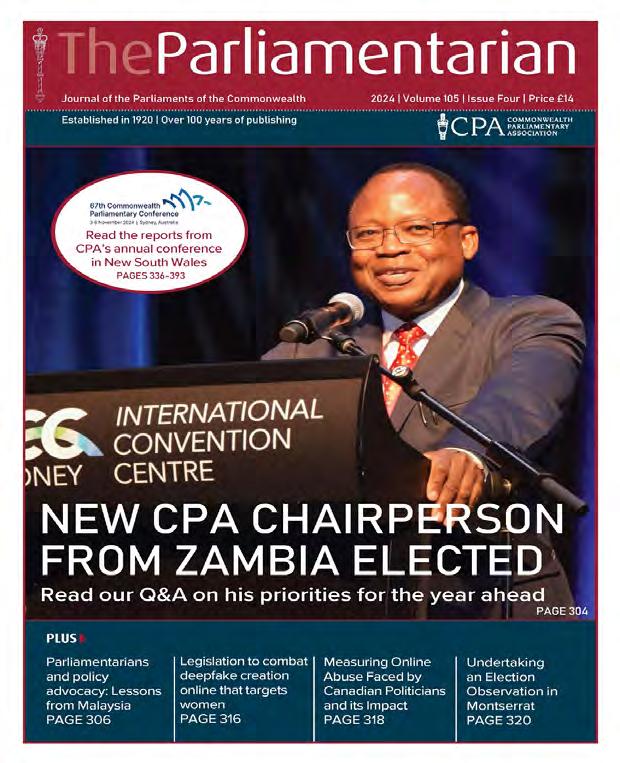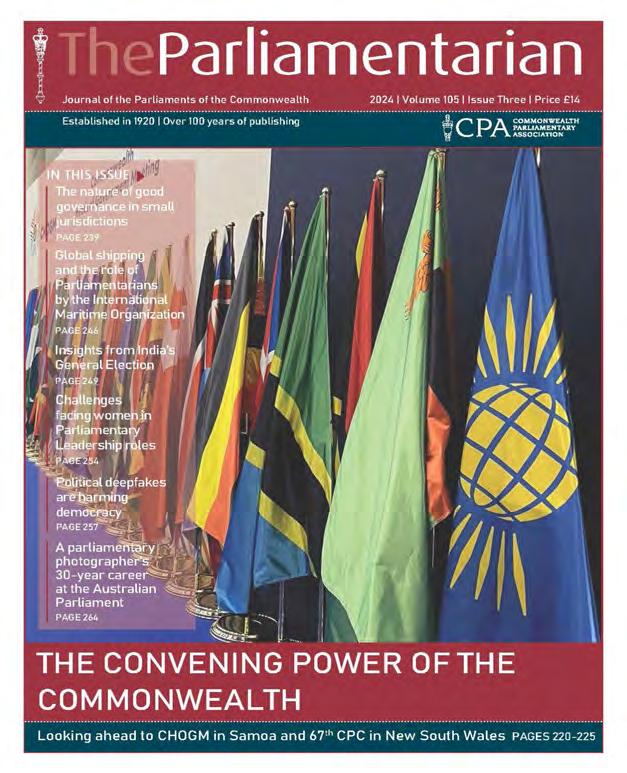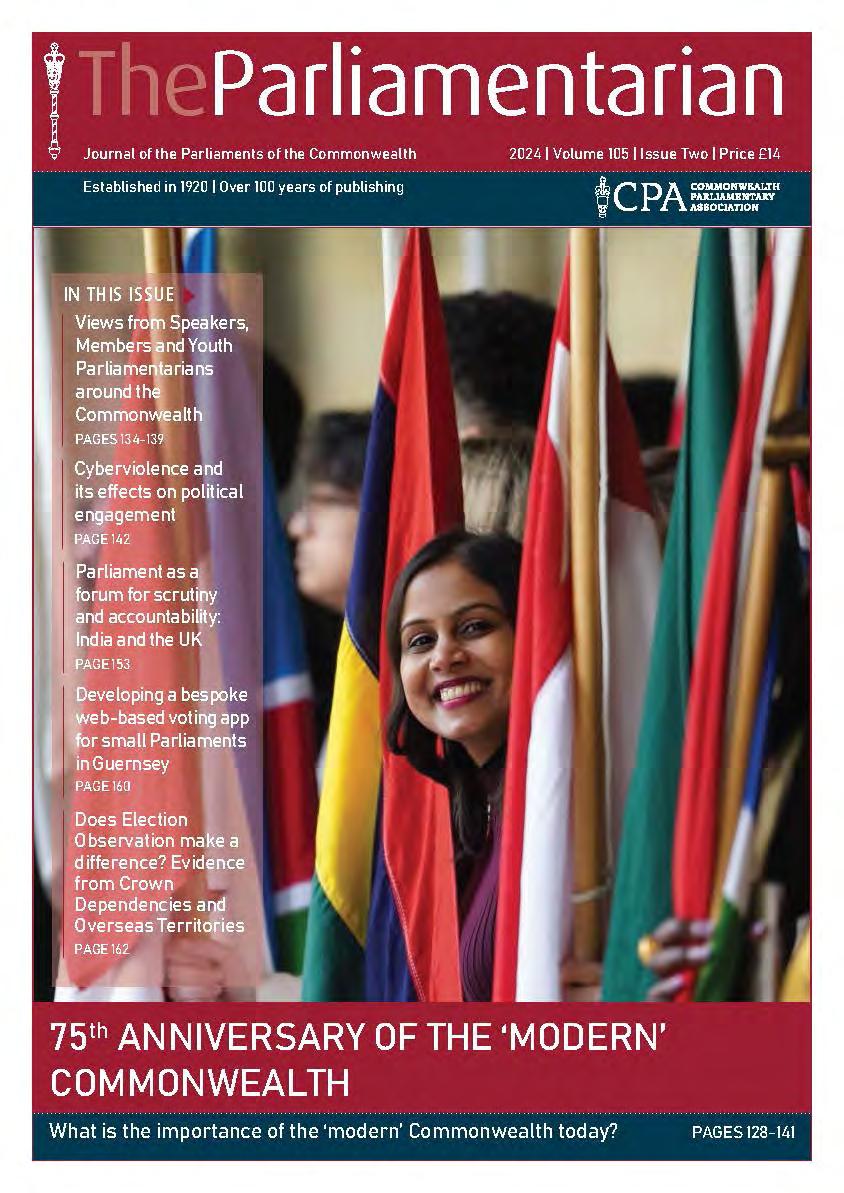TheParliamentarian
JOURNAL OF THE PARLIAMENTS OF


JOURNAL OF THE PARLIAMENTS OF

How are Parliaments legislating on Assisted Dying?
Security, Disinformation and Artificial Intelligence
The impact of hate speech on electoral integrity
Promoting Inclusive Elections for Persons with Disabilities
Bilingual Parliaments in Multilingual Jurisdictions
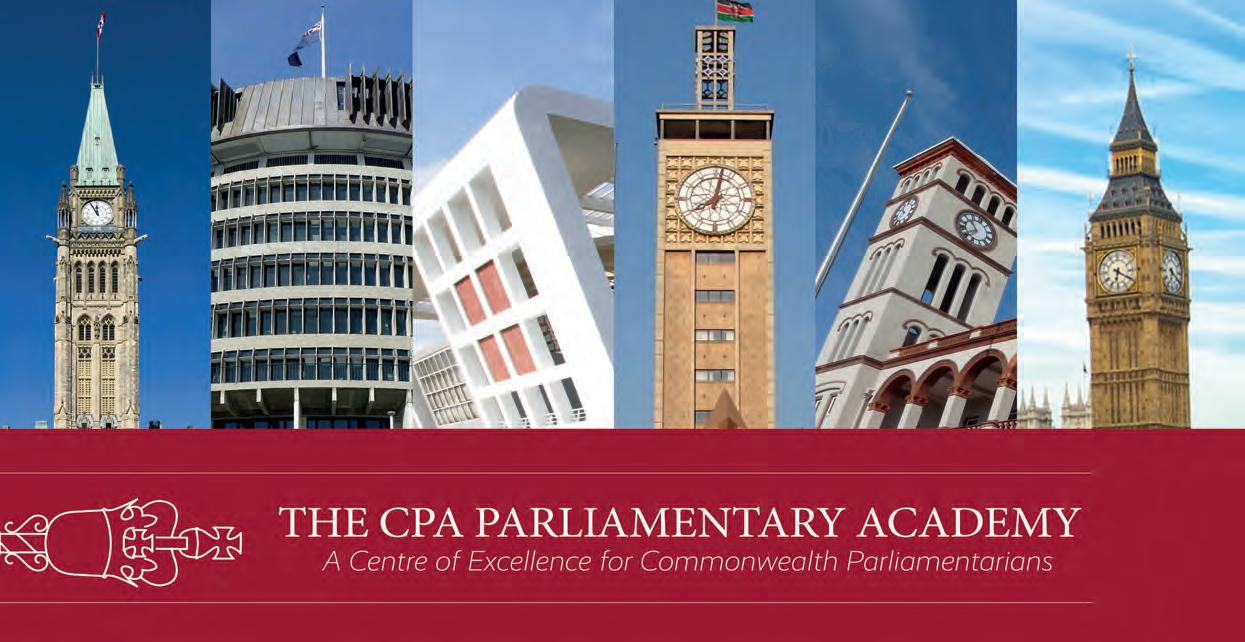

Free courses for CPA Members
The CPA has designed a curriculum of online courses specifically for Parliamentarians and parliamentary officials.
Our courses are intended to strengthen your capacity to fulfil constitutional and statutory obligations as well as to enhance your knowledge and understanding of the role of Parliament in the democratic governance process. These accessible courses offer an adaptive and flexible learning approach, with both written and visual content along with access to a variety of useful resources.
To register for the CPA Parliamentary Academy, please email hq.sec@cpahq.org or visit our website: www.cpahq.org/parliamentary-academy
2 | View from the CPA SecretaryGeneral Tradition and Innovation
4 | Q&A with CPA Small Branches Chairperson
Hon.Valerie Woods, Speaker of the National Assembly of Belize
6 - 9 | Image Gallery Activities in Commonwealth Parliaments
38 - 41 | Legislative round-up
The latest legislative reports from the CPA membership
42 - 43 | Book Review
The Second Chamber in New South Wales
44 | Celebrating Commonwealth Lives Dr Gaositwe Chiepe from Botswana
10 | Women Speakers: Leading Roles Celebrating the three Deputy Speakers of the UK House of Commons
14 | Gender Quotas
The impact of a gender-corrective mechanism in the Maltese Parliament
16 | Women in Manx Politics
Women's experiences in small democracies like the Isle of Man
19 | Assisted Dying: The Ultimate Human Right?
A Member from Jersey shares their view
21 | Engage, Empower, Sustain Charting the course for resilient democracy: A view from Pakistan
The Parliamentarian: Journal of the Parliaments of the Commonwealth | Volume 106 | 2025: Issue One | ISSN 0031-2282
Published by the Commonwealth Parliamentary Association, CPA Headquarters Secretariat, Richmond House, Houses of Parliament, London, SW1A 0AA, United Kingdom.
24 | Security, Disinformation and Artificial Intelligence
A view from a UK MP
26 | ‘Sword lengths and Surveillance’
Addressing security concerns in Parliaments
28 | Combatting Divisive Political Discourse Impact of hate speech on elections in The Gambia
30 | Promoting Inclusive Elections for Persons with Disabilities OSCE Election Monitoring
32 | Disability Inclusion
The Global Disability Summit
34 | Bilingual Parliaments in Multilingual Jurisdictions
A Commonwealth Perspective
Tel: +44 (0) 20 7799 1460
Email: hq.sec@cpahq.org www.cpahq.org Follow us: www.cpahq.org/social-media
Stephen Twigg
CPA Secretary-General
Mr Jeffrey Hyland
Editor, The Parliamentarian editor@cpahq.org

Published just ahead of International Women’s Day, this issue of The Parliamentarian celebrates a number of women - past and present - who are making a huge difference to the Parliaments where they serve.
For the first time in its history, the UK House of Commons has three women Deputy Speakers who speak to The Parliamentarian about their roles and working together across the House. We also examine the impact of a gender-corrective mechanism in the Maltese Parliament, hear women's experiences in small democracies like the Isle of Man and meet the new CPA Small Branches Chairperson from Belize.
This issue also celebrates the life of the inspirational Dr Gaositwe Chiepe from Botswana who was instrumental in making the education system universal in her country as well as serving in Parliament and Government at the highest levels.
This issue features the latest news from the UK Parliament on the passage of Assisted Dying legislation as well as the experiences of Jersey where legislators have been examining new laws; a UK MP gives a security perspective on Artificial Intelligence in our digital information landscape; a new CPA Parliamentary Security Guide addresses security concerns in Parliaments; a correspondent from The Gambia looks at the hate speech affecting political discourse in elections; an expert from OSCE examines how to measure inclusive elections for persons with disabilities; and we also explore the value of bilingual Parliaments in multilingual jurisdictions.
Finally, this issue of The Parliamentarian launches our new design and layout following our content review last year. Please do let us know what you think and any suggestions for new content that you would like to see.
Jeffrey Hyland, Editor, The Parliamentarian, editor@cpahq.org
Annual subscription: Four issues including supplements: UK: £44 inc. postage. | Worldwide: £46 surface post and £52 airmail | Price per issue: UK: £14 cover price plus UK or worldwide postage.
Disclaimer: Opinions expressed in articles published in The Parliamentarian are those of the individual contributors and should not be attributed to the Association.
Contributors: Thank you to all contributors for this issue. Cover image: copyright Maria Unger / UK Parliament.
Print: Warners Midlands UK and Times Printers Singapore. Limited print run - contact Editor for details of print copies for CPA Branches.


The Secretary-General of the Commonwealth Parliamentary Association, Stephen Twigg E: Stephen.Twigg@cpahq.org
'Together we thrive' is the powerful theme for Commonwealth Day 2025. It is a theme which underpins the day-to-day work of the Commonwealth and its diverse range of member countries, organisations and networks – including the CPA.
In January of this year, the enabling legislation for a new legal status for the CPA received Royal Assent. The detailed arrangements for the new status have been agreed between the CPA and the United Kingdom Government. The final stage, over the next six months or so, will be for the secondary legislation to be taken through the UK Parliament. I remain hopeful that this process will be completed in time for the 68th Commonwealth Parliamentary Conference (CPC) in Barbados in October. I have said, on a number of occasions, that we have not sought a new status for its own sake. A new international status for the CPA has great potential to enhance our work in a variety of different ways including strengthening the voices of Commonwealth Parliamentarians in international organisations including the United Nations and the Commonwealth itself. This is of critical importance in an uncertain world in which multilateralism is fragile despite the pressing realities of poverty, conflict and climate change.
Between now and October, the CPA Secretariat will be working on a new Strategic Plan to take our organisation forward over the coming years. We have issued a consultation document and I encourage readers of The Parliamentarian to respond – either via the feedback form on our website (www.cpahq.org/about-us/our-governance/ cpa-strategic-plan/) or by emailing hq.sec@cpahq.org. This first stage is open until 31 March 2025 and its outcomes will be reported to the CPA Mid-Year Executive Committee meeting in London in May 2025 with a recommendation to have a second phase of consultation prior to a draft Strategic Plan being presented to the 68th CPC.
This period of discussion, consultation and deliberation provides an opportunity to reflect on three things:
1. How can the new international legal status assist the CPA to increase its impact over the next four years?
2. Looking at the current priorities of the CPA, are there ways in which our streams of work could be improved to increase their impact?
3. Are there new areas of work which the CPA might focus on in the next period?

Devising a four-year strategy is challenging in a world of sometimes rapid political, social, economic and technological change. Four years ago, as we developed the current CPA Strategic Plan, the immediate context was the impact of COVID19 and this underpinned several aspects of the plan – including the cross-cutting theme of technology and innovation. Today, a major focus of our work on technology relates to the impact of Artificial Intelligence
Left: Following the successful passage of the Commonwealth Parliamentary Association and International Committee of the Red Cross (Status) Act 2025 in the UK Parliament, the UK Government’s Commonwealth Minister, Rt Hon. Lord Collins of Highbury and the CPA Secretary-General, Stephen Twigg signed an agreement to mark the new international status for the CPA.
and we are keen to develop this further in the next Strategic Plan period.
The mid-term review of the current Strategic Plan highlighted areas of work which could be further prioritised by the CPA. One of these is our work on disability inclusion.
The Commonwealth Parliamentarians with Disabilities (CPwD) network is the newest of the three CPA networks. It provides a platform for disability rights to be considered in the work of the CPA as well as delivering practical support to Parliaments via the Capital Investment Fund. There is scope to widen and deepen CPA’s work on disability inclusion at all levels – globally, pan-Commonwealth, regionally and at CPA Branch level. The CPwD will be represented at the third Global Disability Summit in Berlin this April.
Alongside our Strategic Plan consultation, the CPA is reviewing its communications and I am grateful to all of those who have responded to our recent survey as part of this review. Effective communication is essential if the CPA is going to maximise its impact and reflect the shared priorities and goals of its diverse membership
The CPA’s quarterly Journal, The Parliamentarian, plays a vital role in the work of the Association. Last year, we had a review of this publication and a number of changes were agreed. This edition is the first to reflect these important changes. I am hugely grateful to Jeffrey Hyland, CPA Communications Manager and Editor of The Parliamentarian, for his work on this. Jeffrey is our longest-serving staff member and he will celebrate his tenth anniversary at the CPA in May of this year.
As we prepare a new strategy and review our communications, the CPA faces a crucial balancing act between tradition and innovation. Getting this balance right is vitally important as we prepare for our new international status.
2025 will be a busy year of activities throughout the CPA’s membership including at a regional level. In January, I was pleased to meet virtually with the CPA Regional Secretaries and hear more about their plans. In February, the first of this year’s CPA Regional Conferences was held in Lahore, Pakistan, hosted by the Provincial Assembly of the Punjab. This was the first ever joint regional conference of CPA’s Asia and South-East Asia Regions and the first to be attended by the new CPA Chairperson, Hon. Dr Christopher Kalila, MP (Zambia).
As we approach Commonwealth Day, the CPA Secretariat is busy preparing for a range of events over the next few months including the CPA Small Branches Workshop in the Isle of Man, the CWP Workshop in The Bahamas, and the Mid-Year meeting of the CPA Executive Committee in London. In all these activities, we will be guided by the important theme with which I started this article – together we thrive. Let us take the opportunity of Commonwealth Day to celebrate our shared achievements and dedicate ourselves once again to meet the many challenges that the Commonwealth will face in 2025 – and beyond.

Updated as at 3 March 2025
• 8 March 2025: International Women's Day
• 10 March 2025: Commonwealth Day: theme ‘Together We Thrive’
• 10 to 14 March 2025: 73rd Westminster Seminar, UK Parliament (CPA UK)
• 10 to 21 March 2025: 69th UN Commission on the Status of Women (CSW69), New York, USA
• 24 to 28 March 2025: CPA Post-Election Seminar for the Anguilla House of Assembly
• 1 to 4 April 2025: CPA Small Branches Workshop: ‘Effective Parliamentary Democracy in Small Jurisdictions’, Douglas, Isle of Man
• 5 to 9 April 2025: 150th IPU Assembly, Tashkent, Uzbekistan
• 28 April to 2 May 2025: Commonwealth Women Parliamentarians (CWP) Workshop, Nassau, The Bahamas
May
• 12 to 13 May 2025: Mid-Year CPA International Executive Committee Meeting, London, UK
• 22 to 23 May 2025: 2nd Summit of Women Presiding Officers and their Allies, Québec, Canada
June
• 30 June 2025: International Day of Parliamentarism / World Parliament Day (IPU initiative)
• 17 to 20 June 2025 (TBC): 54th CPA British Islands and Mediterranean Regional Conference, Cardiff, Wales
• 30 June to 4 July 2025: CPA Parliamentary Academy: Advanced Residency Programme for Leadership in Parliament for Clerks and Officials, Wellington, New Zealand
July
• 19 to 25 July 2025: 61st CPA Canada Regional Conference, Québec including CWP Canada Regional Meeting
• 28 July 2025: 15th Summit of Women Speakers of Parliament, Switzerland
• 29 to 31 July 2025: Sixth World Conference of Speakers of Parliament, Switzerland (every five years)
August
• 7 August 2025: Parliamentarian of the Year Awards deadline
• 10 to 16 August 2025: 54th CPA Africa Regional Conference, The Gambia
• 12 August 2025: International Youth Day
September
• 15 September 2025: International Day of Democracy
October
• 6 to 12 October 2025: 68th Commonwealth Parliamentary Conference, Barbados including 41st CPA Small Branches Conference; 9th Commonwealth Women Parliamentarians (CWP) Conference; Commonwealth Parliamentarians with Disabilities (CPwD) meetings; 2025 CPA General Assembly; CPA Executive Committee meetings; and 59th Society-ofClerks-at-the-Table (SoCATT) meetings.
For further information on any events, please email hq.sec@cpahq.org or visit www.cpahq.org

Hon. Valerie Woods, MNA is the Speaker of the House of Representatives of the National Assembly of Belize. She was first appointed to the National Assembly as a Senator from 2016 to 2019 and was then elected in December 2020 as the Speaker of the House of Representatives. As the Speaker, she has been a lead facilitator on the CPA’s Administrative Review of the Parliament and on the proposed draft changes to the Standing Orders. She is also pursuing her professional development studies in parliamentary service through the CPA Parliamentary Academy and Gender Studies through the Caribbean Institute in Gender and Development (University of the West Indies). She has served on the Steering Committee for the Commonwealth Women Parliamentarians (CWP) representing the Caribbean, Americas and Atlantic Region.
Q: Congratulations on your new role as the elected Chairperson of the CPA Small Branches. You are a highly experienced Parliamentarian – can you highlight some of the lessons you have learned from your time in the Parliament of Belize?
My time in Parliament has helped me to appreciate the complexities of the Legislature and policymaking, both as an Opposition Member in Parliament and as a Presiding Officer which brings an entirely different vantage point.
Some key takeaways for me have been that legislative work is more than just debating in the House or the Senate. While that is obviously important, for those who are area representatives it is about ensuring that legislation speaks to their constituents, it is about international diplomacy and it is about Committee oversight on the work of government which requires an engaged Parliamentarian and public.
While there will be political differences, progress occurs when, despite these differences, there is collaboration and not just division and opposition so that the outcomes lead to better legislation. The weight of responsibility of a Parliamentarian is immense because the decisions taken by Members of Parliament impact lives, with the fact that public service obligations for the most vulnerable among us must be at the forefront of what we do. The CPA Small Branches have a particular challenge because of their size in ensuring the oversight mechanisms in the Legislature work in these environments. The most critical lesson I have learnt, however, is that public trust in public institutions once eroded is very difficult to regain. Therefore, a cornerstone of good democratic governance is transparency and
accountability of our public institutions, including the Parliament, and engagement of the media in the process. Parliamentary reform is slow, but persistence and advocacy are necessary.
Q: Can you tell us about your experience of the Commonwealth, living and working in a Commonwealth country? How is the Commonwealth viewed in Belize?
The association with the Commonwealth and the CPA has facilitated cooperation in education, in parliamentary exchanges, in the administrative review of parliamentary mechanisms with recommendations for strengthening these procedures in order to increase public engagement and to build the capacity of Parliamentarians. Belize remains an active member of the Commonwealth Parliamentary Association and through our membership in the Commonwealth, Belize has a platform for collaboration on global issues such as climate change, trade and sustainable development.
Of course, regional perspectives are always evolving. Like many other countries in the Caribbean, Belize as a former British Colony also reflects on its past and its sovereignty. Recently, for example, Belize launched a set of new images to feature on its currency that will take effect later in 2025 showcasing the images of Belizean national heroes. This would be the first time that Belize had moved away from the sovereign’s image on its currency (previously all new currency featured the late Queen Elizabeth II). Belize is also engaging in constitutional reform with discussions on its governmental structures. Belize, like other CARICOM countries, has also had discussions on reparatory justice as well. There is significant value in the Commonwealth membership and in continued collaboration with other Parliaments within the CPA’s membership.
Q: You are the fourth CPA Small Branches Chairperson following parliamentary colleagues from Malta, Cook Islands and Australia, and the first from the Caribbean. What is the importance of the Commonwealth and the CPA in the CPA Caribbean, Americas and the Atlantic Region?
It is truly a humbling experience to be elected from among your peers and to be the fourth CPA Small Branches Chairperson (and first from the CPA Caribbean Region) is an honour. It is a responsibility I take seriously as a Parliamentarian. As I mentioned when I was elected at the 40th CPA Small Branches Conference during the week of the 67th CPC last year, the smaller Parliaments
in the Commonwealth bring a unique perspective on the challenges faced by small and island Legislatures within the broader Commonwealth parliamentary community.
There are 50 CPA Small Branches, and our network plays a critical role in shaping a stronger CPA and ensuring that training and legislative assistance are tailored to the circumstances of smaller jurisdictions. Many of the CPA's Small Branches are literally on the frontline of climate change; therefore, we are key to pushing for stronger parliamentary action on climate adaptation, disaster preparedness, sustainable financing and financial assistance models. CPA Small Branches also advocate for greater diversity and inclusion of marginalised groups and in so doing the work of the network promotes CPA’s overall call for gender equality and broader political participation and representation.
The CPA Caribbean, Americas and the Atlantic (CAA) Region comprises 19 Legislatures and the interparliamentary cooperation, capacity building and exchanges within the CPA allow for the opportunity to strengthen our administrative parliamentary processes, to learn from and customise best practices to the nuances of each of our Parliaments. Through active engagement, the Caribbean has a strong voice within the CPA framework on the issues that impact all CPA Branches such as economic growth, human rights, the safeguarding of democracy, the rule of law and the celebration of the cultural diversity in the region.
Q: The CPA networks – Commonwealth Women Parliamentarians (CWP), Commonwealth Parliamentarians with Disabilities (CPwD) and CPA Small Branches – play an important role in connecting Parliamentarians. What role do you see for the CPA Small Branches network in the CPA’s future work?
These networks all bring a particular focused perspective and challenges of parliamentary work and parliamentary mechanisms to the wider CPA community. The CPA Small Branches network can ensure that CPA’s work addresses the governance and parliamentary capacity challenges of small Legislatures due to various resource constraints. Mentorship and peer learning exchanges with larger Parliaments as well as with those other CPA Small Branches that have established practical mechanisms that work in strengthening parliamentary processes and governance are key roles that I envision for the network and which the action plan for 2025 calls for. Of course, smaller jurisdictions will always struggle for a voice on international platforms. The CPA Small Branches network allows for the amplification of our collective voices for the many challenges we have in common that must be a part of the larger decision-making of the CPA if the Association is to truly reflect the voices of the Commonwealth.
Q: What are the key issues facing the Commonwealth’s smallest jurisdictions and how can the CPA Small Branches work together to highlight and tackle these issues?
There are several issues the small jurisdictions of the Commonwealth grapple with from the impact of climate change on our countries and our Parliaments to the practical application of the separation of powers, as well
as sourcing capacity building resources, communication outreach tools and oversight mechanisms that are both practical and functional. The CPA Small Branches network, with the representation of nine CPA Regions on its Steering Committee, can work to ensure that the annual action plan speaks to the tailored needs of smaller Parliaments across the network. Through the annual conferences of the CPA Small Branches, there is also the opportunity to provide a focused space for Members and parliamentary staff from smaller jurisdictions to discuss common challenges as well as to share examples of best practices. These spaces build camaraderie among peers but also highlight the initiatives that can be taken or further strengthened on existing ideas and activities based on the perspectives of other CPA Small Branches. The Regional Initiative Fund is an opportunity that can be better accessed for smaller Legislatures to improve on capacity building and communication outreach. Engaging with each other, including with the other networks of the CPA, is essential for CPA Small Branches to be effective in their parliamentary functions and in upholding the benchmarks of democratic governance.
Q: 60% of the Commonwealth’s 2.7 billion population is aged under 30. How can the Commonwealth and Parliamentarians engage with more young people? How can we involve young people in politics?
Education and awareness of the role of Parliament and how it works is first needed to get our young people engaged. Actively engaging in visiting schools and universities or having media presentations on current issues and the role of Parliament on those issues and on democratic governance can assist in attracting young people to the conversation and in getting involved.
It is important to listen to the views of the youth on their perspective of Parliament and their views on the current performance of Parliaments. If they are tuned in or tuned out, Parliamentarians need to know and understand why. Youth Parliaments and youth councils or forums can be effective spaces to listen to the concerns of our young people and their ideas for resolving current issues. Youth focused legislation can be drawn from these spaces. When the Marriage Act in Belize was amended in 2024 by increasing the marital age to 18 years, it was an exciting time because this was legislation that was the focus of the Belize Youth Parliament from a previous year. When some of the young people were interviewed, the enthusiasm expressed due to their active participation in a forum that contributed to the tabling and passage of this legislation was palpable. Parliaments, in both small and large jurisdictions, can always improve on the engagement of social media and digital platforms to reach the youth which would make parliamentary debates more accessible and more appealing.
Having interactive sessions with a representative grouping of young people can provide a meaningful space for Parliamentarians and young people to listen to one another, garner input and encourage participation in politics.
Right: The Speaker of the House of Representatives at the Parliament of Australia, Hon. Milton Dick, MP met with the Speaker of the UK House of Commons, Rt Hon. Sir Lindsay Hoyle, MP during a visit to Westminster in January 2025. The Australian Speaker also met with the CPA SecretaryGeneral, Stephen Twigg.
Below right: The States Assembly of Guernsey hosted the Standing Committee of the Conference of Speakers and Presiding Officers of the Commonwealth (CSPOC) from 10 to 11 January 2025. Pictured left to right are Lord Fakafanua (Tonga); Hon. Greg Fergus (Canada); Hon. Papali’iLi’o Oloipola Taeu Masipau (Samoa); Hon. Shri Om Birla (India); Rt Hon. Sir Lindsay Hoyle (UK); Hon. Milton Dick (Australia); host Sir Richard McMahon (Guernsey); Rt Hon. Dr Moses Wetang'ula (Kenya). The Parliament of India will host the 28th CSPOC in early 2026.
Opposite page - Below left: The Speaker of the 18th Lok Sabha of India, Hon. Shri Om Birla is greeted by the Speaker of the UK House of Commons, Rt Hon. Sir Lindsay Hoyle, MP for his visit to Westminster in January 2025. The Indian Speaker also visited the Scottish Parliament.
Opposite page - Above: The 41st Canadian Presiding Officers' Conference (CPOC) took place in Iqaluit, Nunavut from 15 to 18 January 2025 with Speakers and Clerks from Canada's Federal and Provincial Legislatures.
Opposite page - Below right: The Commonwealth Women Parliamentarians (CWP) Eastern Cape Chapter in South Africa hosted an induction for newly elected Women MPs from 28-29 January 2025 introduced by the Speaker of the Eastern Cape Provincial Legislature, Hon. Helen Sauls-August.

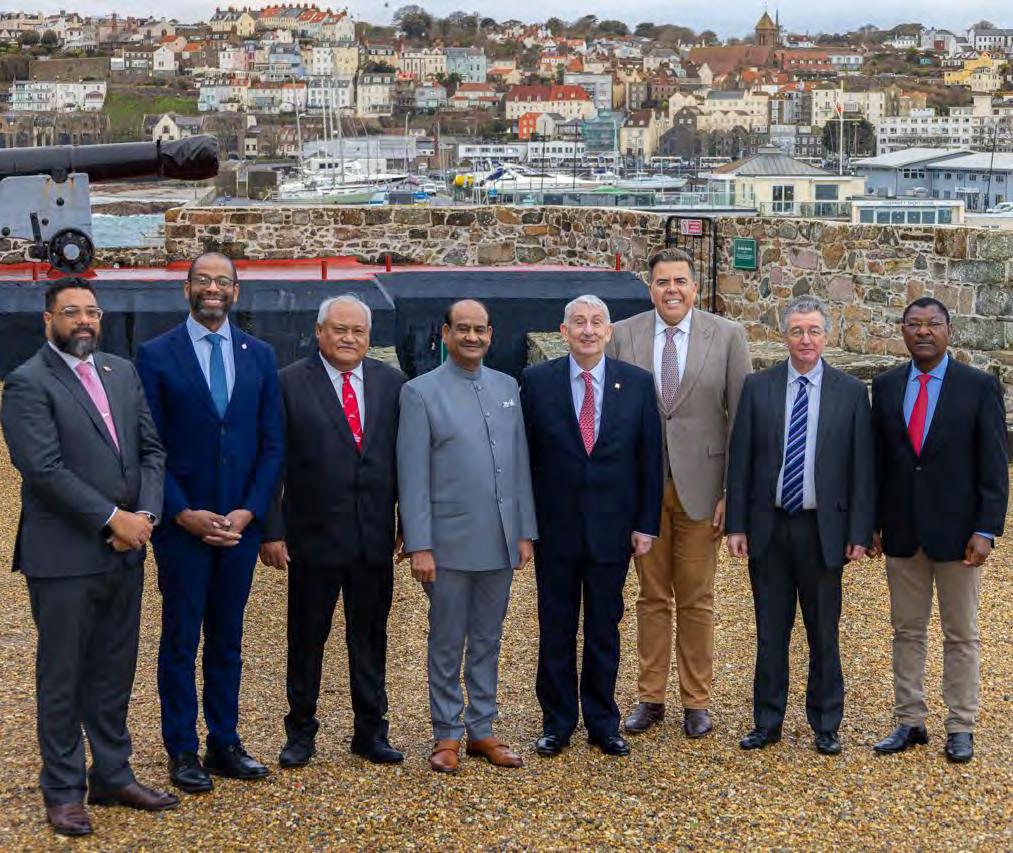
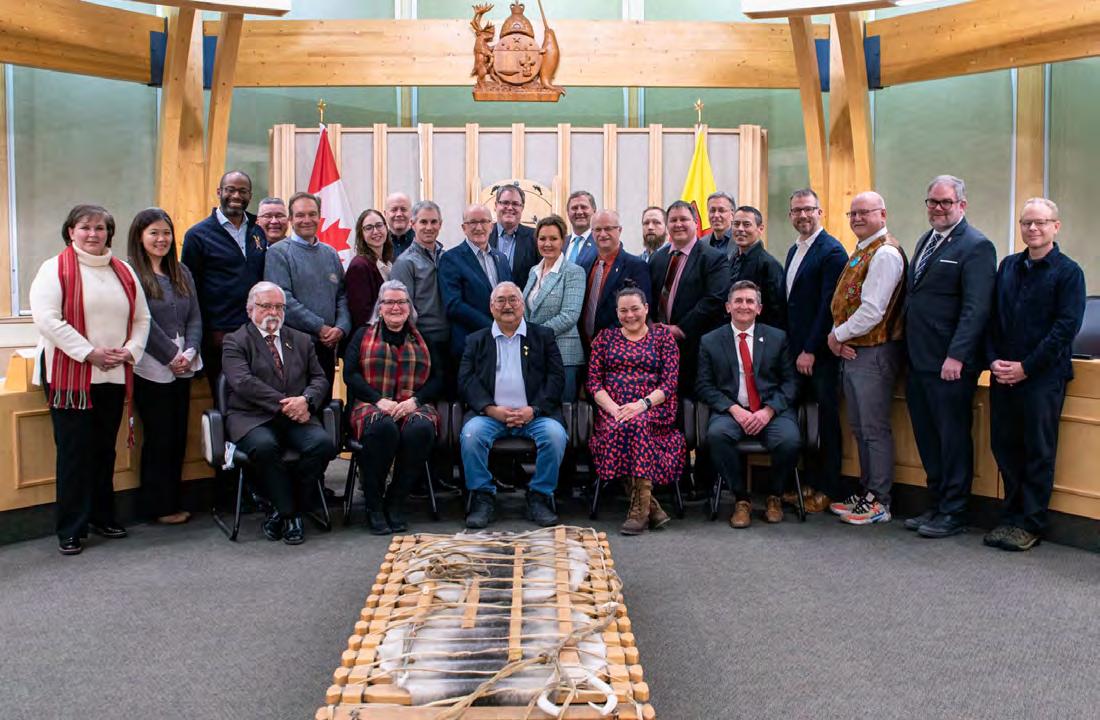
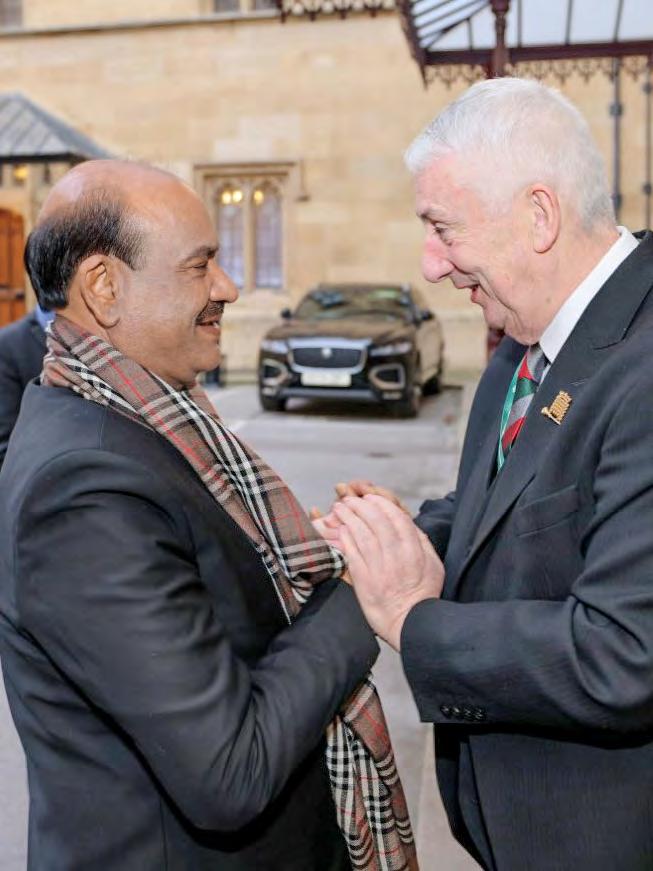
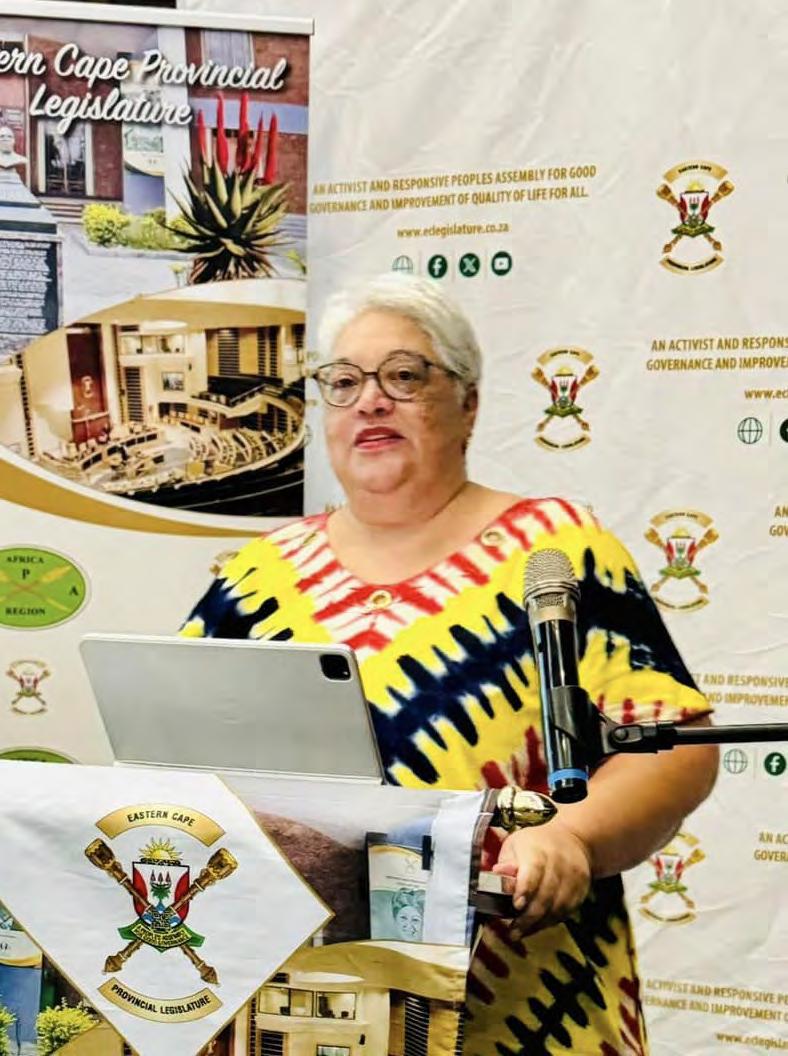
Right: The Commonwealth Women Parliamentarians (CWP) Chairperson, Hon. Dr Zainab Gimba, MP (Nigeria) attended a workshop on advancing gender equality in legislation held by the Women's Parliamentary Caucus (WPC) of the National Assembly of Pakistan from 14 to 15 December 2024 in Islamabad.
Below right: From 13 to 17 January 2025, the CPA were at the Parliament of Jamaica as part of a CPA Democratic Benchmarks assessment. During their visit the Clerk of the Parliament of Trinidad and Tobago, Brian Caesar and CPA’s Fraser McIntosh met with Senate President, Senator Hon. Thomas Tavares-Finson; the Speaker of the House of Representatives, Hon. Juliet Holness; and the Clerk, Colleen Lowe.
Opposite page - Above: The New Zealand Parliament hosted the Australia and New Zealand Association of Clerks-at-the-Table (ANZACATT) Professional Development Seminar from 20 to 23 January 2025 with 90 representatives from across the Commonwealth.
Opposite page - Below left: Hon Noraini Ahmad, MP from Malaysia joins Parliamentarians from 15 Commonwealth Legislatures to discuss the impact of Artificial Intelligence on security and democracy worldwide at a CPA UK Workshop from 28 to 30 January 2025 at the UK Parliament.
Opposite page - Below right: The Speaker of the National Parliament of Solomon Islands, Hon. Patteson John Oti, welcomes Beverly Duffy, Clerk Assistant at the Parliament of New South Wales and CPA's Fraser McIntosh in December 2024 as part of a CPA Democratic Benchmarks self-assessment.

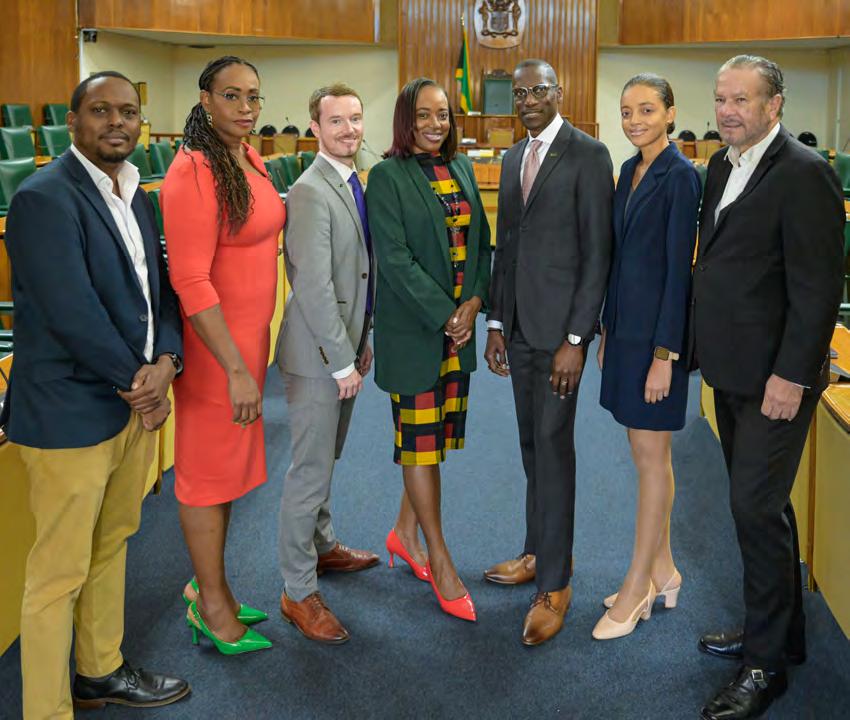


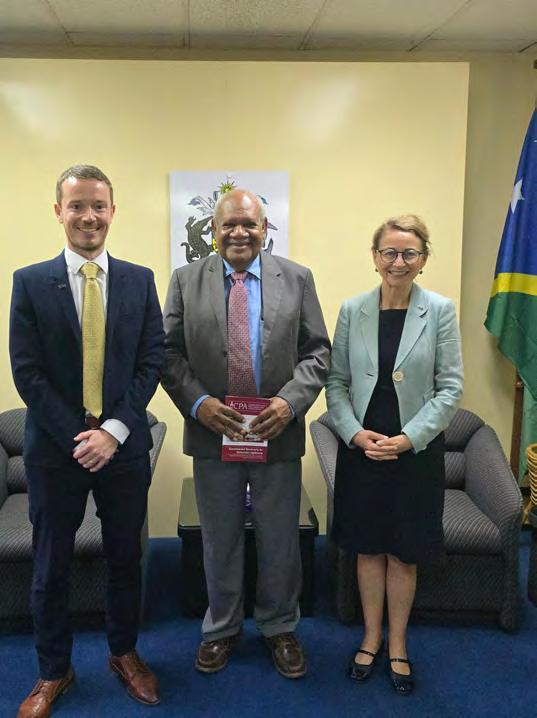

Natasa Pantelic is a founding member of the Labour Women’s Parliamentary Staff Network in the UK Parliament and has worked for a number of UK MPs.
Celebrating the three Deputy Speakers of the UK House of Commons.
For the first time in its history, the UK Parliament has an all-female team of Deputy Speakers in the UK House of Commons. To mark International Women’s Day, Natasa Pantelic interviews all three Deputy Speakers for The Parliamentarian
International Women’s Day is a time to celebrate the roles and rights of women everywhere. This year, I wanted to highlight the three women who serve as Deputy Speakers in the UK House of Commons: Nusrat Ghani, Judith Cummins and Caroline Nokes. There have only ever been 693 women elected to the UK Parliament. Following the 2024 UK general election, 263 of the 650 current seats (40%) in the House of Commons are now held by women. The UK is now 10th in the top ten Legislatures for the number of women in national Parliaments, with Rwanda, Australia and New Zealand in the top three respectively. However, there are only 6,085 women serving as Parliamentarians across the Commonwealth out of an estimated 18,000 Members of Parliament.
On 23 July 2024, following the UK general election, MPs cast their vote (in secret) for three Deputy Speakers following the re-election of Rt Hon. Sir Lindsay Hoyle, MP as the Speaker of the UK House of Commons. The job of a Deputy is to assist the Speaker in their duties in the chair, exercising their authority while doing so. Once elected, Deputy Speakers remain in office until the next general election, unless they resign or cease to be an MP. They also stop being politically active and can no
longer speak in debates in the chamber on behalf of their constituents, as a backbencher would.
Hon. Nusrat Ghani is the Conservative MP for Sussex Weald and was first elected to the UK Parliament in 2015. In the last Parliamentary term, she held Ministerial positions in the Foreign, Commonwealth and Development Office and the Department for Business and Trade. She was elected as the Principal Deputy Speaker and the Chairman of Ways and Means with the most votes cast, elected from the opposite side of the House to the Speaker. By convention, she chairs the Budget debate and has a number of responsibilities including supervising the arrangement of business in Westminster Hall and overseeing the Panel of Chairs (responsible for chairing Parliamentary Committees such as the Public Bill Committees). She is the first woman of colour to serve in the role, describing it as “hugely humbling.”
Hon. Judith Cummins is the Labour MP for Bradford South and was first elected in 2015. She is known as a dedicated local champion for her constituency and has been involved in politics since she was 16 years old. In the last Parliament, she was on the Panel of Chairs and has previously chaired debates in the House of Commons. She serves as the Second Deputy in the team. She is a value driven person and describes her role in protecting our democratic process as her “greatest responsibility as a Deputy Speaker, and the greatest privilege of the role.”
Rt Hon. Caroline Nokes is the Conservative MP for Romsey and
Southampton North and has been an MP since 2010. She was the Chair of the Women and Equalities Committee, well known for working constructively with Parliamentarians across the House on issues such as tackling Violence Against Women and Girls and campaigning for more support for women with the menopause. She has previously held Ministerial positions and served as a Home Office Minister. She is one of the most courageous and inspiring people in the House. She serves as the Second Deputy in the team and says that the Deputy Speakers are “a great team.”
Only eight women have ever served as Speaker or as a Deputy Speaker in the UK Parliament. The first was Betty Harvie Anderson, MP who represented Renfrewshire East from 1959 to 1979, serving as First Deputy Chairman of Ways and Means from 1970 to 1973. The formidable Rt Hon. Betty Boothroyd, the MP for West Bromwich and West Bromwich West from 1973 to 2000, was the second woman to sit in the Speaker’s Chair and is the only woman to have served as Speaker of the UK House of Commons from 1992 to 2000. She would often say that she “loved every minute of it.”
These women serve as role models to encourage more women to put themselves forward for elected office and for senior positions such as Speaker or Deputy Speaker. Our democracies are richer with more women in the room where decisions are made and as Speaker Betty Boothroyd once said: “Go for gold”

Hon.
Ghani, MP, Principal Deputy Speaker of the UK House of Commons and Chairman of Ways and Means. Constituency: Sussex Weald. First elected to UK Parliament: 7 May 2015.
Q: Who inspired you growing up and how did they affect your journey to becoming a Parliamentarian?
I grew up in a non-political household - politics was never discussed. As immigrants, we were busy trying to forge lives in a new country. My mother didn’t speak English and I had limited experiences outside my home, school and local mosque. The malaise of low expectations and limited opportunities meant no one ever thought I would achieve much. However, we did watch the news and Margaret Thatcher and Betty Boothroyd loomed large at home. With my mum, we loved watching these strong, formidable women keeping the country and the House of Commons in check. I was lucky to befriend Betty Boothroyd when I became an MP in 2015 and she didn’t disappoint – still charming, funny, generous with her time for a new MP and sharp!
Q: Why did you stand to be Deputy Speaker?
I know what it’s like to be threatened from doing one’s job as an MP, from
dealing with domestic threats of violence and abuse to being sanctioned by a foreign state trying to close down debate. My motivation is to protect and promote Parliament, our way of public service and democracy, to ensure all elected officials can do their jobs without fear or favour. Democracy is fragile and we should never take it for granted.
Q: What are your priorities for the role?
I understand the privileges we enjoy and the price that comes with defending them. We are living in a time when foreign states are increasingly trying to interfere in our democratic processes. I know first-hand what is at stake: MPs are more and more under threat of statesponsored cyber targeting and threats of violence. My experience has made me keenly aware of the threats we face and the importance of protecting the freedoms that define our Parliament. My approach is collaborative, and I believe that every MP has the right to represent their constituents and contribute to our legislative process. I have always worked across party lines, recognising that some issues are bigger than party politics.
Q: How are you balancing your role as a constituency MP vs a Deputy Speaker?
Balancing my roles has been easier than I expected. There is huge support from the Speaker, his team and the Clerks who are more than happy to provide guidance and advice. I was - until a few months ago - a Minister in two Government departments and overseeing thousands of staff. I had two red boxes every day and weekends with papers for me to lead on domestic and international issues. So, it has been a much easier transition to Chairman of Ways and Means and I get Fridays (when I’m not in the Chair) and weekends to dedicate to my constituency work.
Q: As the first woman from an ethnic minority background to be elected as the Chairman of Ways and Means, how does that make you feel?
It is a huge honour to secure the votes of MPs across the House to sit as Chairman of Ways and Means – following in the great footsteps of Dame Eleanor Laing and Mr Speaker himself. As the first person of colour to have secured the role, it is hugely humbling and I hope it will inspire the next generation of remarkable women who will see what they can be. For many of us, working twice as hard to get half as far may be unfair but it is the reality and we should never give up.
Q: What’s the best thing about working with two other women in the Deputy Speaker role and with the Speaker?
The Speaker is very easy to work with and has a great upbeat positive can do attitude which is infectious. As a new MP dealing with security and safety issues, I nervously approached the Speaker for support, not sure how he would respond or what the process was to get help. The Speaker was just super in getting me the help and security I needed, incredibly fast. That’s his style - if he can fix it, he will. As he also served in the same role, his insights and advice are hugely appreciated by me. Having an allladies Deputy Speaker roster is just great, we are pretty much aligned on most things and we all crack on with supporting the Speaker.
Q: Only 64 women preside over one of the Houses of 190 Parliaments around the world. What’s your message to women in those Parliaments who are thinking about standing for this role but are not sure?
This tells me we still don’t recognise the great contributions of women in public service and in Parliaments and can assume these jobs are for men and their temperaments. I hope more women will see the all-female lineup of Deputy Speakers and recognise they too should compete for these roles.

Hon. Judith Cummins, MP, First Deputy Speaker of the UK House of Commons Constituency: Bradford South. First elected to UK Parliament: 7 May 2015.
Q: Who inspired you growing up and how did they affect your journey to becoming a Parliamentarian?
I have always felt that I’ve been inspired by values rather than by any one individual. Growing up, it was discussions with my family, friends and neighbours that motivated me to get involved in politics.
Q: Why did you stand to be Deputy Speaker?
I believe that every Member must be given a voice in this Parliament. We all deserve to work in a positive and inclusive environment, where everyone is treated with respect and dignity. This is vital for the success of democracy. Standing up for these values is what moved me to stand to be Deputy Speaker.
Q: What are your priorities for the role?
Parliament is at the heart of our democracy. In an age of global political volatility, I am absolutely committed to ensuring that all sides of the Chamber have a voice so that their constituents - the British public - are fully represented. Protecting this democratic process is both my greatest responsibility as a Deputy Speaker and the greatest privilege of the role.
Q: How are you balancing your role as a constituency MP vs a Deputy Speaker? What are you doing differently? Having less sleep and working longer hours!
Q: What’s the best thing about working with two other women in the Deputy Speaker role and with the Speaker?
In the many hundreds of years of the UK Parliament’s existence, this is the very first time that all three Deputy Speakers have been women. It is such an enormous privilege to be working with my Deputy Speaker colleagues in what represents such a significant historical milestone. It is also a great honour to be working with Mr Speaker, who I know has done so much to create a better working environment in the UK Parliament for both Members and staff and to protect the neutrality of the Chair.
Q: What’s your message to women in those Parliaments who are thinking about standing for this role but are not sure? Presiding over often-lively debates requires many skills. You must have a thoughtful respect for all colleagues and work to ensure that all debates are fair. My message to those women who are thinking about standing for a role is to trust in your abilities, and to go for it!
Q: What’s the best piece of advice you’ve ever been given that you’d like to share with women on International Women’s Day?
Don’t let other people define you and don’t give up at the first hurdle.
Q: Finally, do you have a favourite procedural rule from Erskine May?
Until as recently as 1998, there was a procedural rule that meant that any MP wishing to raise a Point of Order would be required to speak with a hat on. Collapsible top hats were kept in the Commons chamber for this purpose and were thrown to the MP raising the Point of Order. The rule was eventually withdrawn after the Modernisation Select Committee found that the practice ‘brought the House into greater ridicule than almost any other, particularly since the advent of television’!
From previous page 10.../
Q: What’s the best piece of advice that you’d like to share on International Women’s Day?
I’m grateful to the women and men in Wealden for electing me as their first female MP in 2015 and I’m pleased to now be representing Sussex Weald as its first MP. When I was growing up, it was inconceivable that someone like me could be active in politics. My journey has not been easy, but it's been exciting to see changes and opportunities for women opening up within my own lifetime. I am proud to have made history as the first female Muslim Minister to speak at the dispatch box and to be the first woman of colour to be elected as Chairman of Ways and Means. I hope that this will inspire local girls from workingclass backgrounds like me to consider jobs they believed were out of reach for them. Despite the difficulties that life in public service brings, I believe we must have the courage to own our space, be heard and speak truth to power. We still have work to do to ensure that women and girls have the opportunity, safety and security to excel in all areas of life. We should continue to lift each other up and cheerlead the fantastic strides that women are making in their lives to make a difference.
Q: Finally, do you have a favourite procedural rule from Erskine May?
No doubt each and every contribution from Members is invaluable and enlightening. One of my favourite Erskine May procedural rules is: ‘Mr Speaker, or the Chair, after having called the attention of the House or of the Committee to the conduct of a Member who persists in irrelevance or tedious repetition either of his own arguments, or of the arguments used by other Members in debate, may direct him to discontinue his speech.’

Q: Who inspired you growing up and how did they affect your journey to becoming a Parliamentarian?
I always say my dad at this point, but not entirely sure if that is true. He certainly showed me the importance of standing up for what you believe in, doing what you think is right for your local community and not being afraid to stick your head above the parapet! However, there have been lots of other people along the way, some of the best advice has always come from the most unexpected sources, and I can always remember Joan Ruddock being a fabulous source of inspiration in the Lady Members' Room when I was a new MP in 2010. Theresa May was an absolute rock as Party Chairman when I was first selected. Perhaps the biggest influence was an A-Level Economics teacher, back in 1988, who used to yell at me, "answer the question set" whenever I splurged everything I knew about supply and demand onto four sides of A4. It was perhaps really bad advice when it came to interviews though, I am not so great at the ‘Matt Hancock pivot’.
Q: Why did you stand to be Deputy Speaker?
I have had a number of different roles both in Parliament and in Government. I loved being a member of the Panel of Chairs in the last Parliament, chairing both debates in Westminster Hall and Committees. It gives you the opportunity to learn more about your colleagues, the issues they care about and what makes them tick. Some of the best moments have been sitting listening to the new MPs' maiden speeches, finding out that absolutely everyone represents the most beautiful constituency in the whole country. However, it is a massive responsibility, and I never forget that. Each and every day I go into that Chair with the ‘don’t mess it up’ words of Ru Paul ringing in my ears!
Q: What are your priorities for the role? I want colleagues to be the best they can be, for their constituents and in holding the Government to account. It is very challenging when there are so many new MPs to give everyone the chance to shine, but they are making a great start! I well remember what it was like as a new MP, when the Chamber was still quite a daunting place (it still can be, even for an old bag like me!) so it matters that you help new Members find their feet, encourage them when they do something brilliantly and gently correct them when things go wrong. Of course, they will go wrong, things do for everyone, what matters is that we all learn and move on.
Q: How are you balancing your role as a constituency MP vs a Deputy Speaker?
I do find it difficult when there are debates which my constituents really care about to be in the Chair rather than speaking. However, you learn quickly the different ways to use any influence you have, and it is just a new way of working, away from the jostle of party politics. One of the challenges
is that I just have less time in the constituency and in front of my evergrowing inbox. Sundays have become an absolutely essential opportunity to clear the emails before the mayhem starts again on a Monday morning.
Q: What’s the best thing about working with two other women in the Deputy Speaker role and with the Speaker?
We make a great team, we all work very hard to support Mr Speaker and get on brilliantly. I can honestly say I feel blessed. There are always those classic little moments when Judith has to do up my dress for me (I am not sure I would have asked a male fellow Deputy to do that), or you just nip into the Chamber to see if one of your colleagues needs a loo break! Sometimes the Chamber is cold, the shifts can be long, and you just need a five-minute comfort break, that's why it really helps that we all get on and are happy to help each other out.
Q: What’s your message to women in those Parliaments who are thinking about standing for this role but are not sure?
Do it! It is difficult, sometimes stressful, but a massive privilege. I have not regretted putting myself forward for this role for one single moment.
Q: What’s the best piece of advice you’ve ever been given that you’d like to share on International Women’s Day?
That you don’t have to aspire to be like anyone else, just be you. Oh, and wear what you like. I have spent my whole life listening to other people about what I should wear. Don't listen. Be happy in your own skin and your own clothes.
Q: Finally, do you have a favourite procedural rule from Erskine May?
A favourite? No, but I love a Point of Order. They're almost invariably not a Point of Order but the MP who has raised it usually gets a wry smile from me as I explain that to them. They know it’s not a Point of Order, I know it’s not a Point of Order, but it’s on the record anyway.

A recent CWP webinar examining the impact of gender quotas in Parliaments heard about the impact of a gender-corrective mechanism introduced in 2021 that has resulted in increased women’s representation in the Maltese Parliament.
When the CPA Malta Branch hosted the 2024 British Islands and Mediterranean (BIM) Regional Conference of the Commonwealth Women Parliamentarians (CWP) on International Women’s Day, Malta’s Gender Corrective Mechanism was a key focus of interest. It is the only Parliament in the BIM Region to have adopted such a mechanism to address the issue of persistently low women’s representation in Parliament, which stood at 13% before the last election in 2022 and jumped to 28% when the mechanism was employed.
The mechanism is essentially a ‘topup’ system which is triggered once results have been established following an election: if less than 40% of women win seats, a maximum of 12 additional seats are allocated to the bestperforming women. The mechanism includes an unconditional sunset clause, so it expires after 20 years.
In 2022, more women ran for election, although the percentage of women elected was well below 40%, resulting in the mechanism being applied. Most of the 12 women taking up the additional seats were newcomers – including me. I believe that having more women in Parliament has had a very evident effect on the style of debates and the issues on the parliamentary agenda. This is the same in Parliamentary Committees, which have benefitted from a more diverse
composition. The result has been to give more women more exposure, and influence in decision-making.
The biggest obstacle is around public perception. The women elected under the mechanism can be seen as ‘undeserving’; and there was anecdotal evidence that many voters chose not to vote for women as “they will be elected anyway”.
It is clear that not everyone in Malta is convinced. A recent Eurobarometer survey on gender stereotypes asked if ‘temporary measures (e.g. quotas) are necessary to overcome the existing under-representation of women in politics’ with 62% of Maltese respondents disagreeing (compared to an EU average of 36%).1
The real test will be at the next election in 2027 to see how the public will react and if more women are elected under their own steam. There is also more work to do at a party level, to ensure that they field more female candidates.
I was pleased to share Malta’s experience during CPA BIMR’s webinar on ‘Gender Quota Mechanisms in Parliaments’ (20 January 2025). The webinar was an output from the 2024 BIMR CWP Regional Conference in Malta, with many attendees expressing interest in finding out about different mechanisms used to address stubbornly low
representation of women in Parliaments across the world.
British academic Professor Sarah Childs, who has worked with CPA on its ‘Gender Sensitising Parliaments Guidelines’, spoke at the webinar making a strong case for structural interventions to enable diverse candidates to be elected. She argued that interventions can be tailored to fit different electoral systems and referenced the UK Labour Party’s All Women’s Shortlist policy which was used in vacant, target seats. This led to a doubling of Labour women MPs at the 1997 UK General Election. At the 2024 UK General Election, 46% of Labour MPs elected were women.
Wherever you live in the Commonwealth, it can still be a struggle for women in Parliament. During the webinar, Hon. Beatrice Elachi, MP from Kenya described the slow progress of the two-thirds gender rule to bring more women into Parliament. Kenya’s 2010 constitution states that not more than two-thirds of the members of elective and appointed bodies shall be of the same gender.
Hon. Beatrice Elachi stated “What we need is to come up with a clear strategy. How are we going to lobby? How are we going to ensure we don't end up having the Bill left on the floor of the House?” She also went on to make a clear case for the importance
of keeping gender equality high on the political agenda, pointing to the weakening of women’s rights both in the political sphere and more widely in society.
The webinar chair and Member of The Scottish Parliament, Sarah Boyack, brought the webinar to a conclusion, speaking about the importance of networks and sharing good practice. The CPA has recently commissioned a research piece on the use of quotas and other interventions to address the under-representation of women in Commonwealth Parliaments. It will be a helpful resource providing valuable evidence-based research on the different types of mechanisms used in different contexts, and what the results have been.
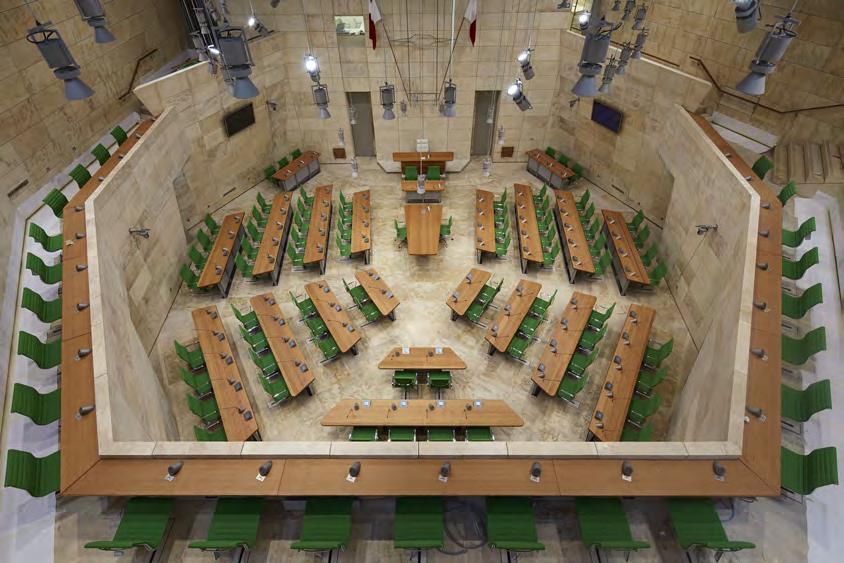
the history of Malta. I do recognise, however, that there is a lot of work to be done to make sure that it is not perceived as simply a token, but that it contributes to the changing of attitudes.
Our new system in Malta has given us immediate results and has given us a far better ratio of women in Parliament than ever before in
Hon. Naomi Cachia, MP is a member of the Maltese House of Representatives since 2022 and is the Government Whip. She serves as the Maltese Head of Delegation to the Parliamentary Assembly of the Council of Europe and is a member of the Commonwealth Women Parliamentarians (CWP) British Islands and Mediterranean Regional Steering
How can you make your Parliament a gender-sensitive institution?
Committee. Over the last 10 years, she has been representing the Labour Party’s progressive agenda both locally and internationally, championing gender equality in Parliament, Vote16 and youth participation in politics. Naomi Cachia is a lawyer and qualified mediator by profession.
References:
1 ‘The Maltese are most sceptical in EU on gender quotas in politics’, The Times of Malta, 18 December 2024 https://timesofmalta.com/article/themaltese-sceptical-eu-gender-quotaspolitics.1102593.
• The Commonwealth Women Parliamentarians (CWP) network is an active advocate for women's representation in Parliament, seeking to ensure Parliaments are gender-sensitive institutions.
• The CWP network has produced two complementary publications to help Parliaments through the gender-sensitisation process.

Download your copy online at: www.cpahq.org or email hq.sec@cpahq.org to request a copy

A new research report examines the experiences of women candidates and legislators in small democracies like the Isle of Man.
The Isle of Man is a small democracy with a distinctive relationship with the United Kingdom. It is not a sovereign state, but instead a Crown Dependency with a very high degree of autonomy over domestic matters. The most important element of the Manx constitution is the Tynwald – a tricameral Legislature composed of two chambers. The dominant chamber, the House of Keys, consists of 24 directly elected Members of the House of Keys (MHKs). Women became eligible to become MHKs in 1919, since which time 23 women have served as MHKs; 13 of whom were first elected in the 21st century. Today, there are 10 women sitting in the 24 Member House.
Between 2022 and 2024, we explored the distinctive challenges and opportunities that women experience as political representatives in a small democracy, even one with such strong institutional, cultural and economic alignment to the UK. We used a variety of methods, including legal, historical and electoral analysis, but found interviews with current and former women in Manx politics particularly illuminating. We interviewed eleven such women – a good proportion of all women Members who have ever sat in the Keys. We supplemented these interviews with two focus groups: one
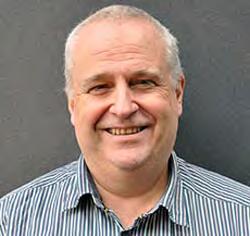
Professor Peter Edge is Professor of Law at Oxford Brookes University and specialises in small democracy constitutionalism.
of the families of women politicians, and one with women who had seriously considered standing, but ultimately decided not to.
We found that experiences of gender in Manx politics are not merely quantitatively different when compared to larger democracies such as the UK, for instance in terms of constituents per representative; but qualitatively different as a result of the interconnected ramifications of these quantitative differences. We found three important areas of difference: the relative unimportance of political parties, not uncommon across small democracies; the intimacy and vulnerability intrinsic to small democracies; and limits on national capacity due to a small national budget. We found these differences impacted across the life-course of a woman in Manx politics – from their political apprenticeships, through campaigning, to being a woman MHK.
Political parties have never been a dominant force in Manx politics. Although some countries and jurisdictions use parties as a mechanism to improve women’s participation in the Legislature, some of our participants felt the absence of

Dr Catriona Mackie is Lecturer in History at University College Isle of Man specialising in social and cultural history.
party politics positively contributed to creating a more flexible political space. Our participants identified a range of other forms of political apprenticeship – a family tradition, elected office outside the national Legislature and, most recently, serving as an indirectly elected Member of the subordinate second chamber of the Tynwald Parliament, the Legislative Council.
A key limit on the number of women in the Keys is the decision by women to stand – success rates for men and women who do stand have been almost identical since 1919. For the minority of our participants who were in a political party, the views of party colleagues were key to their decision to stand. For most, outside of political parties, the views of friends and family were seen as central to deciding to stand. Participants were particularly mindful of how their standing might impact friends and family members. Participants identified a wide range of reasons for standing, the most important of which were dissatisfaction with the treatment of particular issues, or with existing candidates, or judging that the Keys needed more women’s voices. Perhaps equally important were the reasons that women gave for not standing: financial constraints, the interests of children (particularly

Dr Alex Powell is Principal Lecturer in Law at Oxford Brookes University specialising in gender, sexuality and law.
young children), worries about the availability of childcare, and the level of personal attack to be expected both in person and online. Our participants gave particular stress to attack from the electorate, rather than from fellow MHKs.
Turning to campaigning, one distinctive feature of the Manx landscape is the emphasis on door-knocking by the candidate. The lack of a party system on the Isle of Man and the intimacy of the Island has led to a situation where candidates are expected to knock on doors throughout their constituency themselves. Personal security while door-knocking was on the minds of many of our participants, who developed strategies to manage their own safety. The absence of a party system meant that these strategies could not take account of an institutional memory. One of our participants recounted a difficult encounter with a householder with mental health issues who took the opportunity of her door-knocking to invite her inside and discuss “all sorts of conspiracies”. The householder’s carer arrived and helped her to deal with the situation. In reflecting on the experience, she noted “Social Services […] they have lists with places where they won’t send solo staff into without support or known issues and things like that. Because we don’t have anything, any access to that” even when, as she noted, this issue was known to other Parliamentarians.
There was a general feeling among our respondents that this was an issue that impacted men less; indeed, that some male candidates were instead aware of a need to ensure women householders did not feel uncomfortable when they knocked.
The absence of a party-political apprenticeship during which a new MHK would have become familiar with the duties of the office, together with the lack of developed party systems

to support new representatives, means that the induction carried out by Tynwald is particularly important for all candidates, but especially those from historically underrepresented groups.
A key feature is that, as a Parliamentary induction, it occurs once the candidate has been elected. One
respondent noted some of the issues dealt with in this induction were ones that candidates could usefully have been aware of – for instance, “how to avoid getting yourself conflicted horribly in planning […] a lot of this would have been better before the election, because it's that point when
people are saying to you, oh, what's your comment.”
Outside the chamber, a distinctive feature of Manx political life is the “always-on” nature of being an MHK. This was a recurrent theme across our interviews. Without a staff to support, and with a home address available to the public, being an MHK was felt to be a 24/7 job. Examples given were being asked for an update on the progress of legislation when shopping for groceries, being asked about constituency issues by multiple constituents while having dinner out for a special occasion, and especially, late night telephone calls by constituents in significant distress. It struck us repeatedly during our interviews that the typical MHK did everything related to their work. Unlike in, say, the Senedd of Wales, where there is a substantial annual staffing allowance to allow staff support to be employed “to enable the performance of the Member’s duties”, there is no provision for an allowance to allow an MHK to employ any form of administrative support or constituency staff.
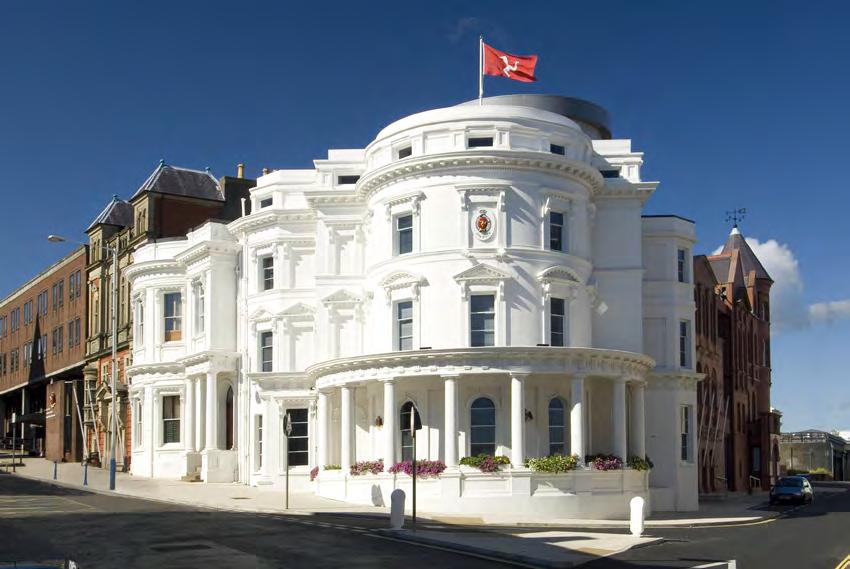
of our participants felt that women in the chamber changed the culture of the chamber – from creating space for the integration of emotion into political life, to allowing politicians to present in a non-masculine manner, to changing the “mood and tone of debates” It also changed the appearance of the chamber from that of “a male dominated old boy’s club” to one which was not a “man’s world”
Within the chamber, our participants saw benefits, but also dangers, from their perspective as women. They saw themselves as bringing particular expertise to bear on topics such as assisted dying, the interests of mothers, “women’s priorities”, education and financial management. On other occasions, men in Tynwald assumed that a woman had a specific expertise. Such expectations of differing contributions to a more diverse chamber could be both empowering and constraining. Many
Understanding these features of the experience of women in small democracies has policy implications. One example arises from an intersection of three distinctive features of the Manx experience discussed above: the absence of parties, the importance of door-knocking in campaigning and the importance of state-led induction. In the absence of parties which can prepare candidates for the campaign process, it is recommended that Tynwald consider providing optional induction for those who have declared their candidacy. Building on the current materials provided to candidates, our study suggests this could usefully cover personal security when campaigning,
potential pitfalls generated by campaign statements if elected and strategies for dealing with misogyny both online and offline.
This could usefully draw on existing foreign models such as that of the UK’s Local Government Association Independent Group, which offers a nine session ‘Candidate School Programme’ which includes a session from Elect Her; as well as the CPA Parliamentary Academy’s ‘Induction for New Parliamentarians’ online course, aimed specifically at candidates running in elections as well as newly elected Parliamentarians.
References:
• Edge, Mackie and Powell, ‘Becoming a woman politician on the Isle of Man: How smallness explains political culture’ (2025) Social Politics: International Studies in Gender, State & Society.
• Women in Manx Politics project page: www.brookes.ac.uk/research/units/hss/ projects/women-in-manx-politics.
This project was funded by Culture Vannin (https://culturevannin.im/) and is based at Oxford Brookes University.

Deputy Tom Coles is an elected Member of the States of Jersey Assembly representing St Helier South since 2022.
A number of Commonwealth jurisdictions are examining legislation designed to facilitate Assisted Dying. This article shares a view from Jersey.
At the 67th Commonwealth Parliamentary Conference in Sydney, New South Wales, Australia in November 2024, I was asked to lead a CPA World Café discussion on Assisted Dying with MPs from many different places.
I am from Jersey, a small island in the English Channel that, like many other jurisdictions, has been asking whether to allow Assisted Dying to take place.
Jersey’s journey on this subject started in 2018 when a member of the public created an e-petition calling for a change in the law to allow Assisted Dying. The petition received 1,861 signatories, which was quite high by Jersey’s standards. This prompted a public engagement process in 2019, which included an online survey, a GP and Doctors survey, as well as several public meetings, to gauge the community support for Assisted Dying. The result of this led to the Minister for Health and Social Services establishing a Citizen’s Jury, which met in 2021.
On 13 October 2021, the Jersey Council of Ministers (our Government) lodged P.95/2021, the principles of which sought to allow Assisted Dying in Jersey and proposed that the relevant legislation would be presented to the States Assembly for debate before the 2022 General election. This was subsequently amended to allow for greater detail to be presented to elected Members, so that they would have sight of the processes and safeguards which would form the legislation. As well as providing greater clarity, the amendment also moved
the potential date for the legislation debate until after the 2022 elections. The amended version of P.95/2021 was adopted in November 2021.
On 22 March 2024, the new Council of Ministers lodged P.18/2024, which set out more detailed principles to allow Assisted Dying in Jersey. The key to this proposition was that it identified the two routes whereby Assisted Dying would, if adopted, be allowed to take place. Route One provided for those suffering from a terminal illness with a life expectancy of 6 months or less, or 12 months for a neurodegenerative condition, and Route Two allowed for Assisted Dying on the grounds of unbearable suffering. When the matter was debated in May 2024, Route One was adopted, however, Route Two was rejected. Work is now ongoing to draft the legislation.
The question posed for at the CPA World Café session for discussion was ‘Is Assisted Dying the ultimate human right?’ and this is a very interesting question.
I remember back in secondary/high school when we studied the history of medicine. The big stand out point was the ‘Hippocratic Oath’, named after the ancient Greek physician Hippocrates, often regarded as the ‘Father of Medicine’. There is a key part to that oath ‘First, do no harm’, that is used in the argument against Assisted Dying. I found this argument particularly strange as, during old medicinal practises of 'the four humours', bloodletting used to not be considered as 'harm', even though it meant cutting a patient. The less said
about field amputations the better. The reason this wasn’t considered 'harm' is because, at the time, they believed consequences of not carrying out these actions would lead to further suffering.
Another part of the Hippocratic Oath argument, which is flawed, is that doctors haven’t sworn this oath for a very long time. The modern oath which doctors swear, places greater emphasis on scientific knowledge, patient privacy, responsibilities to society and compassionate care.
The question ‘What is compassionate care?’ is where doctors’ opinions and ethics start to differ. During the CPA World Café session, a man joined my table, he was a Muslim by faith and a doctor by profession. He pointed out that, in his country, if he worked for the state he would be obligated to conduct medical procedures, like abortions, if they were requested, whereas if he was in private practise, he would be able to refuse. He was an interesting man, but very balanced in his response to the question of Assisted Dying. Given the option to vote on an Assisted Dying debate, he would vote against it because of his faith, however, if it was legal, he would assist with someone’s death. His logic was, as a doctor, he must respect the patient’s autonomy. He would prefer to see someone have an assisted death than someone suffer because of a failed suicide attempt.
So, are there enough End-of-Life pathways to respect our autonomy? In Jersey, there are different types of 'End of life care', from the known
“ The debate on Assisted Dying is far from straightforward. It weaves together threads of personal autonomy, ethical principles, legal frameworks and deeply held beliefs.”
palliative care received at our local hospice, where people are treated with respect and dignity and made as comfortable as possible. This might include prescribing strong painkilling drugs, possibly with heavy sedation.
We can request a ‘DNR’ or ‘Do Not Resuscitate’, meaning that any attending doctor, nurse or paramedic will not try to resuscitate you or provide external treatment should you collapse. Interestingly, if you have one of these DNR’s, they should be kept in your fridge. So, if a paramedic ever comes to your home and checks your fridge, that’s what they are looking for.
There is the end-of-life pathway, the modern version of the Liverpool Care Pathway, which is when all treatment is removed, which can include the removal of food and water, life support systems and allows the body to die. This usually occurs in hospitals and patients are sedated and given painkillers.
What if these end-of-life pathways do not suit you or your condition?
There are many countries that allow Assisted Dying, the majority of which only allow it for people with terminal conditions. However, there are some countries, Belgium, Canada, Luxembourg and the Netherlands, which allow the practice for unbearable suffering, both physical and mental. The challenge here is who decides what is unbearable?
The reason I supported Jersey having an Assisted Dying option for unbearable suffering (Route Two) was because of the proposed framework that would be put in place. It was suggested that there should be a longer minimum timeframe for an assisted death to be granted in these circumstances and that during this time a full review of all treatments that the person had considered and tried could be undertaken, as well as a
review of what treatment options, if any, remained. This would be carried out by a different doctor and confirmed by another. This was important to me, as we should not allow Assisted Dying to be the easy default position.
There are points, in this debate, that both sides agree on: the need for safeguards to prevent coercion, the requirement for capacity to make an informed choice, the necessity for the service to be requested and not offered, and the assurance that no medical practitioner should be obligated to take part.
The coercion risk is an interesting one; who are these awful people that would encourage someone to end their life? With a terminal illness diagnosis, the probability of coercion is reduced. However, with unbearable suffering, coercion could be more of a risk, whether malicious, due to potential inheritance, accidental, by being overly concerned for a loved one’s comfort or by frustration with someone's physical changes and challenges.
Access to different Assisted Dying routes require different timeframes. Someone with a terminal illness who wishes to choose the manner of their death requires the process to be completed quickly. For those who are experiencing unbearable suffering, though no one wants anyone to suffer more than they must, taking the time to get it right is important. Time to carry out the medical review, time to ask questions to ensure that no coercion is taking place, and time to ensure that this is what the patient wants.
This is why conditions and pathways must be different to allow an assisted death for a terminal illness and for unbearable suffering.
When we talk about consent, in its broadest sense, we respect that ‘No’ is the ultimate. Once someone says ‘No’, all and any action on that person must
stop. When it comes to autonomy and an act carried out on a single person, why should one person’s right to say ‘No’ impinge another’s right to say ‘Yes’?
If Assisted Dying is permitted, then those who do not wish to have one, do not have one. Doctors that do not wish to participate, do not participate. Everyone can make a choice that suits their needs and beliefs; however, if Assisted Dying is not permitted, then only those that don’t want anything to do with Assisted Dying get their needs met.
The debate on Assisted Dying is far from straightforward. It weaves together threads of personal autonomy, ethical principles, legal frameworks and deeply held beliefs. As we move forward, it's crucial to keep the dialogue open, inclusive and respectful, ensuring that diverse perspectives are heard and valued. In Jersey, the path toward legalising Assisted Dying has been marked by careful consideration and robust public engagement. While there is still work to be done in crafting the final legislation, the discussions thus far reflect our collective commitment to exploring this complex issue with empathy and integrity.
Ultimately, the question of whether Assisted Dying is the ultimate human right invites us to reflect on what it means to live and die with dignity. It challenges us to consider how we can best support one another through life's most profound transitions, ensuring that compassion and respect remain at the heart of our approach.
As Jersey continues its journey, may we strive to create a framework that honours both the sanctity of life and the dignity of choice, navigating this delicate balance with the wisdom and care it demands.
For more details of Jersey’s journey visit www.gov.je and search ‘Assisted Dying’.
Charting the course for resilient democracy: A view from Pakistan: Responding to the 67th Commonwealth Parliamentary Conference.
Resilient democracy is the ability of democratic systems to endure, adapt and thrive amid political, social and economic challenges. In an increasingly interconnected and volatile world, democracies must evolve to withstand both internal and external shocks, maintain legitimacy, protect citizens' rights and foster inclusivity. For democracy to remain resilient in the face of these challenges, it must be adaptable. The global context is constantly evolving, and democracies must adjust to emerging threats in order to thrive.
To safeguard democracy's future, democratic leaders must craft a new vision that not only defends democratic values but also strengthens its institutions. This entails inclusive engagements of the people at all levels of the democratic process to reinforce their trust in democracy. The vision should also consolidate the gains of inclusive democracy and empower the masses by making their choices count and their voices heard and by empowering them to craft their own destinies. The success of resilient democracy lies in the sustainability of its dividends for the masses and strategic international cooperation to sustain the gains of democratic development. This article advocates that fostering resilient democracy is contingent upon democracy’s capability, adaptability and flexibility to respond to these profound challenges.
Capability, adaptability and flexibility Democracies around the world are facing numerous global and regional
challenges that threaten its stability and survival. Naming few challenges at global, regional and national level includes the rise of authoritarianism, lack of freedom of opinion and press, the rise of disinformation, economic inequality, declining trust in democratic institutions, climate change, geopolitical tensions, foreign interference, cyber security and the rule of law pose significant challenges. Overall, these challenges range from the erosion of civil liberties and the weakening of democratic institutions to external pressures and economic inequality that leads towards serious risks to democracy worldwide.
To respond to these challenges, it is important that democratic processes should be capable, adaptable and flexible. These qualities help democratic systems to become more resilient, withstand crises, build the trust of people in democratic governments, respond effectively to emerging challenges and evolve in ways that ensure its stability. Capability within democratic systems ensures that government institutions perform effectively, deliver services, maintain law and order and safeguard the rights of its people, thus building public trust and preventing democratic backsliding. Adaptability in democratic systems allows governments to adjust towards emerging issues like climate change, cybersecurity and public health crises, ensuring that they are responsive to citizens' needs. Flexibility is crucial for managing diversity, encouraging inclusive decision-making and fostering
cooperation among political parties, even in times of crisis.
Pakistan’s path to resilient democracy
The Parliament of Pakistan has taken several significant steps in shaping a resilient democracy, despite facing challenges such as economic instability, political uncertainty, countering violent extremism and accountability.
In addition, Constitutional development in Pakistan has played a vital role in promoting democracy. The 1973 Constitution laid strong foundations by establishing a parliamentary system that emphasised representative governance and accountable leadership. It empowered citizens by ensuring the protection of fundamental rights, allowing them to engage in political processes, challenge government actions and safeguard their freedoms.
The Parliament of Pakistan has enacted legislative and institutional mechanisms to ensure democratic resilience and pave the way for democracy's capability, adaptability and flexibility to respond to profound crisis and ensure the engagement and empowerment of its citizenry to consolidate the gains of democracy.
Notable in this arena was the 18th Constitutional Amendment (2010) that proved pivotal in empowering the Provinces through increased autonomy, thereby fostering greater political participation and inclusion, particularly for marginalised regions. This decentralisation of power reflects Pakistan's diverse ethnic and
linguistic communities and promotes democratic representation at the local level, supporting a more balanced and inclusive governance structure. The said amendment paved the way for preventing institutional and nondemocratic transgressions leading to building a resilient democracy.
The Parliament of Pakistan also introduced reforms in the form of Constitutional amendments and legislative mechanisms to enact election reforms that ensures that the voice of the people genuinely count and broadens the representative pathways for all the segments of society, particularly women. By re-orienting provisions on campaign finance, the reforms have embedded transparency and inclusivity in the election system. Moreover, the judicial reforms have also ensured the true spirit of the separation of powers and prevented institutional transgressions in the parliamentary and democratic processes.
Such constitutional development and a strong consensus of the political players in Pakistan has contributed to the engagement of citizens, the empowerment of diverse regions and groups and the sustainability of democratic governance. While challenges remain, the constitutional framework provides a foundation for continued democratic progress, emphasising the need for ongoing reforms to strengthen and preserve Pakistan's democracy.
“ By fostering joint action on pressing global issues like climate change, migration and economic inequality, parliamentary networks can create a more cohesive approach to democracy-building.”
Engage, empower and sustain through cooperation
Regional and international cooperation of democracies for promoting resilience faces several challenges primarily arising from political, structural and institutional factors. One significant challenge is the divergence in political ideologies and governance models among member states, which can hinder consensus-building and slow down collaborative efforts. Some countries may be reluctant to adopt democratic reforms due to their internal political realities, including authoritarian tendencies or entrenched power structures. Limited resources and capacity gaps in some Parliaments, especially in developing nations, can restrict their effective participation in regional or international forums. Geopolitical tensions and competing national interests can also create obstacles to effective cooperation, as countries may prioritise their strategic or economic objectives over shared democratic values.
Engagements of Parliaments through various forums, like the Inter-Parliamentary Union (IPU), the Asian Parliamentary Assembly (APA), the Commonwealth Parliamentary Association (CPA) and other forums, provide avenues for engagement in dialogues, exchange of best practices and collective decisionmaking. Multilateral efforts through organisations such as the United Nations facilitate joint action through peaceful diplomatic means, emphasizing the importance of respect for sovereignty while advocating for shared democratic values. These forums contribute towards enhancing parliamentary diplomacy through joint resolutions and collaborative efforts on shared global issues, like climate change, political instability and conflict that can foster stronger ties between nations and promote the broader objective of building resilient democracies.
With cooperation at regional and international level, Parliaments can build relationships across political
and cultural divides, helping to bridge differences in governance models and political ideologies. Parliamentarians can discuss challenges, share best practice and learn from successful democratic reforms implemented in other regions or countries. An empowered resilient democracy can be attained by working together through joint resolutions, agreeing on cooperative actions and adopting strategies to address common challenges.
Parliamentary diplomacy, supported by these regional and international platforms, can also promote a culture of collaboration rather than competition among nations, enabling the peaceful resolution of conflicts and advancing shared democratic values.
By fostering joint action on pressing global issues like climate change, migration and economic inequality, parliamentary networks can create a more cohesive approach to democracybuilding. These collective efforts not only empower individual Parliaments but also contribute to creating a more resilient global democratic order that is adaptable, inclusive and responsive to emerging challenges.
The sustainability in charting the course of resilient democracy lies in long-term cooperation. One essential factor for sustainability is the institutional strengthening of Parliaments, especially in developing countries, through continuous capacitybuilding programmes and technical assistance. Addressing resource gaps and improving legislative processes, Parliaments can become more effective in fulfilling their democratic roles, ensuring that reforms are implemented and maintained over time. Ultimately, sustainability in resilient democracy can be achieved by prioritising inclusive engagement and longterm collaboration. By committing to ongoing dialogue, mutual respect for sovereignty and shared democratic principles, regional and international parliamentary forums can ensure that democracy remains strong, adaptive and enduring, laying the foundation for future generations.
Challenges and way forward Democracy today faces several significant challenges that threaten its stability and effectiveness. One of the foremost issues is the spread of disinformation and conspiracy theories, particularly through social media. This distortion of information undermines public trust, weakens informed decisionmaking and fuels political instability. Another challenge is the rise of populism and illiberalism, where populist leaders often challenge democratic norms and institutions, at times adopting authoritarian practices that erode rights and freedoms. In addition, economic inequality deepens political inequality, prioritising the interests of the wealthy elite and fostering alienation among the public, which undermines trust in democratic processes.
To safeguard democratic resilience, several solutions must be pursued. Democracies must remain adaptable by utilising constitutional safeguards. This includes upholding human rights, the rule of law and ensuring a vibrant civil society to defend democratic values. Promoting inclusivity is also vital, as democracy must continue to evolve and ensure that all citizens have a voice
in the political process. Strengthening key democratic institutions, such as free media, an independent judiciary and a robust civil society, is crucial for maintaining accountability and protecting against abuses of power.
Addressing economic inequality is another essential step to strengthening resilient democracies. Policies that reduce disparities and ensure equitable access to resources, education and healthcare foster political equality and social cohesion, thereby enhancing public trust in democratic institutions. Democratic systems must remain flexible, adjusting to contemporary challenges while safeguarding core democratic principles. By balancing progress with the protection of rights and freedoms, democracy can continue to thrive and evolve in an everchanging world.
Given the nature of the complexity of challenges that democracies face, building democratic resilience is extremely important to build, retain and sustain the people's trust in representative institutions. For that to happen, democracies must put in place strong mechanisms to ensure capability, adaptability and flexibility to respond to the challenges ranging from the rise of economic inequality and climate change to the rise of undemocratic regimes. Deepening citizenry's engagement, empowerment and sustaining their trust is the central pillar of the global effort to consolidate and protect the democratic present and future.
This article for The Parliamentarian was provided by the Research Directorate at the National Assembly of Pakistan Secretariat.
Below: The Provincial Assembly of the Punjab hosted the first ever joint CPA Asia and South-East Asia Regional Conference in Pakistan focusing on development, Artificial Intelligence, climate change and gender equality from 6 to 10 February 2025, The CPA Regional Conference was hosted by the Speaker of the Punjab Provincial Assembly, Hon. Malik Muhammad Ahmad Khan and delegates adopted the Lahore Charter committing to democratic accountability and sustainable and inclusive Legislatures.
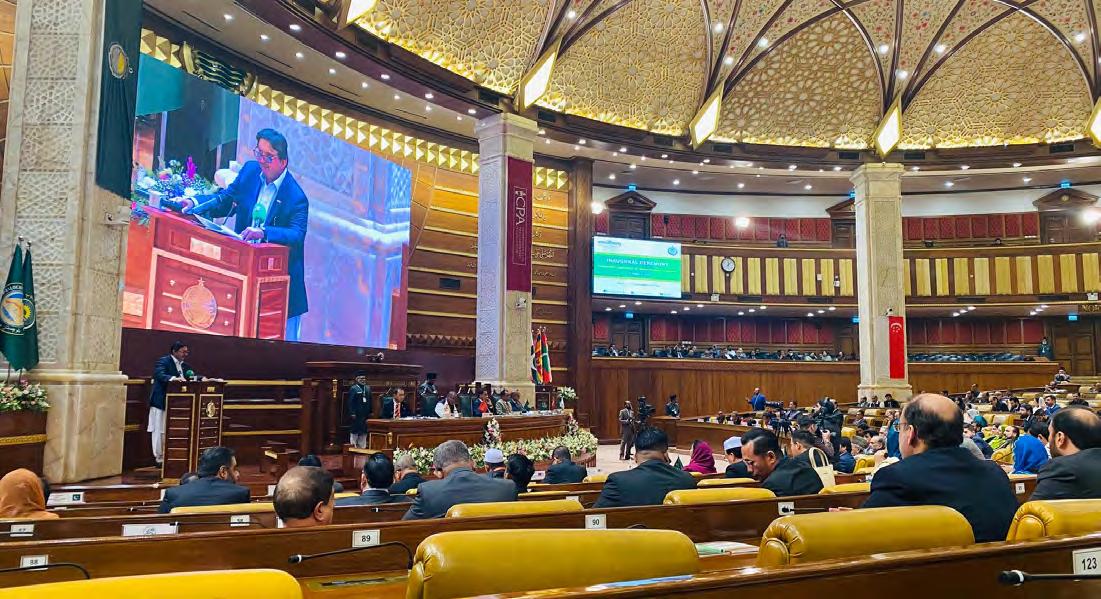
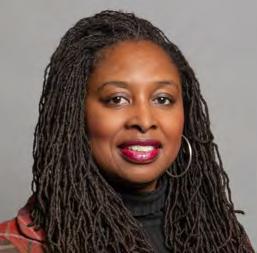
Artificial Intelligence (AI) truly has the power to transform our lives for the better – but we are currently at a crossroads. Readers of The Parliamentarian may not know that my first job was in the world of computer science, working as a computer programmer. Since then, I have maintained a strong focus on science and technology, especially AI, as its influence on our daily lives has grown rapidly in recent years.
During my time on the UK House of Commons Science, Innovation and Technology Select Committee, we scrutinised AI technology. We ensured the release of the vital AI report before the UK General Election in 2024 due to its pressing importance. What has struck me the most is that in the main we have no idea where the information has been gathered to build these systems. I was honoured and pleased to attend the
recent CPA UK ‘AI in Security Workshop’ as a UK Delegate. The Workshop was designed to bring together Parliamentarians from across the Commonwealth to talk about this issue. As the long-time Chair of the All-Party Parliamentary Group for Jamaica, and as someone of proud Jamaican heritage, the Commonwealth and its values and contributions are incredibly important to me, and I hope to continue forging stronger relations with these nations.
Since I was first elected to the UK Parliament in 2005, I’ve seen the societal, economic and cultural changes experienced by my constituents at home, and watched how the world has changed beyond these shores. One of these deep shifts that cuts across everything is the increasing use of AI tools. As a Parliamentarian, I have an active interest in how Artificial Intelligence tools are used within our

society. In 2023, I raised the question during a backbench-led debate in the UK House of Commons about how organisations are sourcing and using data to train AI models. This was imperative because improper scrutiny of the process of sourcing and using data could lead to automated discriminatory biases within AI models. Since then, I have helped to launch the cross-party AI Parliamentary Scheme, led by Demos and in partnership with Google, which is designed to empower MPs with the knowledge they need to confidently engage in informed decision-making.
During the recent CPA UK ‘AI in Security Workshop’ (pictured left), I chaired a roundtable on AI and its relationship with disinformation during elections around the world in 2024. Though we are familiar with the risks of AI-generated disinformation, it was important to have an open and candid discussion about the depths to which AI-generated content can impact the decisions made by individual voters. After all, we know that AI generated content, such as deepfake videos and AI enhanced images, have already been circulated during election cycles (in some parts of the world), so where do we go from here?
Disinformation has always existed, and always will, whether it is produced by foreign actors or domestic threats. AI tools, however, lower the barrier to entry to produce content that is designed to misinform large groups of people. Today, AI generated media appearing in social media feeds is accepted as normal: it is a feature of our information landscape. A portion of that landscape, however, is liable to disinformation: in other words, content produced to intentionally mislead or misinform us.
While people have always been exposed to disinformation, having it as an almost guaranteed part of the online experience calls for a new way of engaging with online content. As social media algorithms can perpetuate exposure to AI generated disinformation, I believe it is sensible to have mechanisms in place that clearly and reliably alert users to whether an image or video is AI generated or enhanced. However, can we provide credentials to credible content? How we do this is still open to debate. We know it is not enough to rely on users to adopt a sceptical approach: the need for a ‘credibility watermark’ stems from the phenomena that while people can be persuaded by disinformation, people can also disregard credible information in an attempt to navigate what is true and what is not. This is commonly known as the ‘liar’s dividend’. AI generated disinformation, particularly deepfakes, are not always produced to convince someone that something happened when it didn’t. Sexually explicit deepfakes targeting women, including those in politics, have changed the levels of risk when it comes to sexual harassment and reputational damage. This is a security
issue that must be taken seriously and acted on. Harmful deepfakes perpetuate violence against women. They attack the autonomy of elected women Parliamentarians, or women candidates eligible to run for election.
The AI tools used to produce harmful deepfakes become the vehicle through which a foreign actor undermines genuine participation in politics, or through which a domestic threat could express their malicious intent towards women Parliamentarians. Sexual harassment, revenge porn and blackmail are pre-existing criminal issues, but with access to AI tools, the barrier to entry in committing these crimes is lowered while simultaneously heightening the impact on human lives as well as the space in which women participate in democracy.
Unfortunately, it is unlikely that such deepfakes will ever be completely removed from the internet. The approach here should be to contain this content, demonetise it and make it inaccessible. The UK’s recent inclusion of sexually explicit deepfakes under the Sexual Offences Act is a step in the right direction, but other existing laws around privacy and defamation may be useful in tackling this.
AI will most definitely be fundamental looking forward. I remain clear it can be a force for good – but only if we prepare ourselves mentally, through critical thinking embedded in everything that we do. We must be alert to the importance of our data and the desire of bad actors in the arena to manipulate and destroy for selfish gains. So, I will stay sober at this AI party to ensure that, even though no one can stop the acceleration of AI, we must ensure there are appropriate guardrails in place. We must seek to prohibit its most dangerous uses, such as deepfakes and ensure that there are red lines that must not be crossed. We must strive to have an understanding of how AI systems are built ensuring transparency at all levels of design and implementation.
Hon. Dawn Butler, MP was first elected to the UK Parliament as the Member of Parliament for Brent South in 2005 and became the first elected African-Caribbean woman to become a Government Minister in the UK. She was later re-elected for Brent Central in 2015 and Brent East in 2024 following constituency boundary changes. She is an Executive Committee member of the CPA UK Branch.

In my capacity as Head of Programmes at the CPA, I often edit our latest commissioned toolkits, handbooks or guidelines. It’s an interesting opportunity to learn about a subject new to me. Most recently I have had the pleasure of working with Dr Paul Martin CBE in developing ‘Parliamentary Security: An Introductory Guide’, which I encourage everybody to take a look at. The Guide is designed to provide a short yet insightful aide-memoire to Parliaments in assessing security risk, examining the different threats and tools that can be employed to mitigate the risks.
I have now been working on the UK Parliamentary Estate, for close to twenty years, and I have experienced first-hand the day-to-day frontline security measures in place, from airportstyle security screenings to being ‘told off’ by the police for mistakenly entering a restricted area. In all that time, I have never really thought of the complexities involved. For example, the risk assessments, specialist knowledge, technology and political implications needed to secure a Parliament. Sadly though, I, like many of my current and former colleagues, have been present during some extremely violent incidents when that cloak of security is so important and frankly lifesaving. What I found especially interesting about the information in this latest Guide was the concept of ‘insider threats.’ These threats come from within and tend to be trusted individuals who have access to people, buildings, infrastructure and information, and who, for whatever reason, abuse that trust by behaving maliciously or potentially causing harm. It conjures spies and anarchists, like characters out of Joseph Conrad or John le Carré novels.
However, what happens when that insider risk is from a Parliamentarian? I have been struck (if you’ll pardon the pun) by the number of violent outbursts by Parliamentarians in legislative chambers. Most recently, the incident in the Parliament of The Bahamas where (for the second time in its history – the first being in 1965) a Member of Parliament flung the parliamentary mace out a window. Although nobody was injured, there are more extreme examples in recent years across the Commonwealth from Sierra Leone to Guyana. If you are a fan of schadenfreude, check out a website dedicated to fighting in Parliament (https://parliamentfights.wordpress com). It is certainly not a phenomenon contained to one country or region. Although not quite old enough, even I am aware of the famous incident in 1976 in the UK House of Commons when Rt Hon. Lord Heseltine – then MP (alias Tarzan) swung the parliamentary mace at the government frontbench.
As part of a study conducted by my colleague Charlotte Corby, approximately twenty-six incidents were reported concerning violent outbursts by Parliamentarians within Commonwealth legislative chambers (and Members’ Lobbies and Division Lobbies) since 2023. However what causes such incidents to occur? What can drive a Parliamentarian to commit such extreme and unusual acts? In the case of Michael Heseltine, it was because an informal agreement on pairing was reneged upon (or perceived to be). With the recent case in The Bahamas, the Opposition Member felt that he was being silenced by the Speaker during a heated debate on corruption in the police force. The
study found that there are other factors at play, namely:
• Political tensions: Political parties and individual Parliamentarians may have strong ideological differences and disagree on key issues. This can lead to heated debates and tempers flaring.
• Personal animosity: It is not uncommon for Parliamentarians to have personal grudges or conflicts with one another. These personal issues can spill over into parliamentary proceedings and lead to physical altercations.
• Disruptive behaviour: Some politicians may intentionally try to disrupt and obstruct parliamentary proceedings by shouting, interrupting or engaging in other disruptive behaviour. This can lead to scuffles as other Members and officials try to restore order.
• Provocation: In some cases, Parliamentarians may try to provoke their colleagues in order to get a reaction or gain an advantage. This can lead to physical altercations.
• Cultural differences: Parliaments can be made up of politicians from a variety of cultural backgrounds, and these differences can sometimes lead to misunderstandings or tensions.
• Emotions running high: Parliamentary debates can be passionate affairs, and it is not uncommon for politicians to become emotionally charged during debates. This can lead to poor decision-making and potentially physical confrontations.
• Media attention: The live broadcasting of parliamentary debates can increase public awareness of the political frustrations of certain Parliamentarians or political groups.
In his latest book, ‘Inside the Political Mind’, Greg Power observes that “the vast majority of fights start
with differences over policy. But what makes them combustible is when they turn into arguments over process. It is the belief that the rules are being abused, distorted or ignored in order to gain political advantage that creates such anger.” In a way that is right. There can be a perception that governments or other influential actors are playing a winner-takesall, zero-sum game - stifling debate, and opportunities for effective questioning and accountability. This in turn creates frustration and anger.
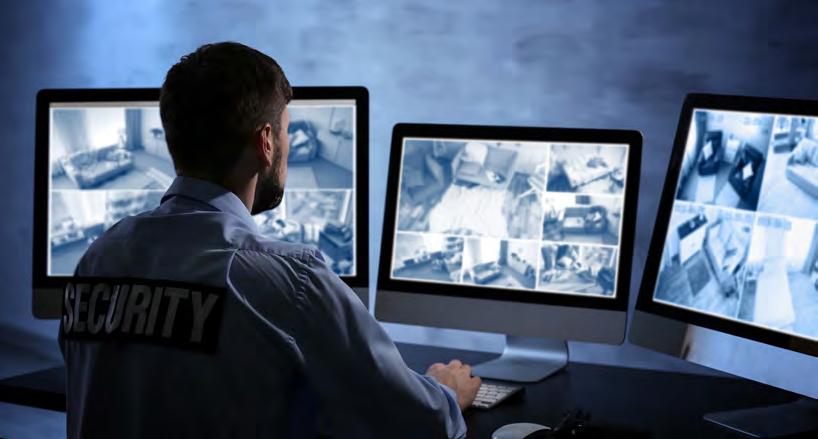
In the CPA’s new toolkit, Parliamentary Security: An Introductory Guide, negative human behaviour is highlighted as a central factor behind insider threats. Numerous studies have suggested that human behaviour is negatively influenced by working in a toxic environment. A place where bullying, pressure and physical stressors are rife. Sound familiar? Far too many of the Parliamentarians I have worked with over the years would say that Parliaments can be some of the most toxic workplaces, especially when a divisive political environment exists. The ‘Bear Pit’ (the unfortunate moniker given to the New South Wales Legislative Assembly) and the Legislative Council commissioned the Broderick Review which highlighted that “Bullying is a significant issue across Parliamentary workplaces in NSW. It is systemic and multi-directional…” The Review mirrors many other inquiries, both within and outside Australia, and are positive initiatives intended to identify failures, and establish an agenda for changing the political culture for the better.
In conclusion, it must be stated that violence in any form is unacceptable. Political leaders within Parliament and outside have a responsibility to prevent such violence from occurring. However, if the root of the problem is an embedded political culture, comprising toxic masculinity, violence, division and historic tensions, these cannot
be overcome by one person through one-off actions. It requires commitment and process changes led by Parliament as a whole, but also involving political parties and wider stakeholders. Some of those levers of change are:
• Open dialogue: whereby Members and other parliamentary stakeholders have opportunities to air grievances without fear of reprisals. Speakers or other leaders organise a stocktake on mood and morale through surveys, one-to-one conversations, or in an extreme way, independent commissions and inquiries.
• Training and development: give importance and implement robust systematic approaches to training, especially for newer Members whereby ethics, standards, behaviour and conduct are embedded into good practice.
• Mental health and well-being: Parliaments should be committed to providing mental health support through training, guidance, openness and anti-stigma campaigns, services and schemes and work-life balance (see the CPA’s Mental Health Toolkit for Commonwealth Parliaments).
• Practices and Procedures: Parliaments should ensure that Standing Orders and rules of procedure are up to date, emphasise conduct and behaviour and provide clarity on its application and punishments.
• Codes of Conduct: a code or codes should be in place for Members,
Ministers and parliamentary staff to abide by and there should be ethical advisors, Commissioners of Standards and Committees to uphold and police such codes (see the CPA’s Standards for Codes of Conduct for Members of Parliament and the Parliamentary Workplace).
• Keeping Order: the important role of the Speaker, Presiding Officers, party leaders, whips and senior officials in maintaining order and encouraging a positive working environment and inter-parliamentary relationships.
• Intelligence, mediation and conflict resolution: investigations are proactively undertaken to identify where and when a violent outburst may occur, and sufficient security or mediation is utilised to minimise risks and consequences. Outside agencies are called in to support political mediation to secure a better political working environment for the medium to long-term.
• Duty of Care: Parliamentarians have a clear understanding of their duty of care towards everyone who works or visits the parliamentary precinct and/ or associated parliamentary offices.
This article was written by Matthew Salik, Head of Programmes at the CPA. Views and opinions expressed are his own. To download a copy of the new CPA toolkit, ‘Parliamentary Security: An Introductory Guide’, please visit www.cpahq.org

Alhagie M. Dumbuya is Director of Library and Research at the National Assembly of The Gambia.
Democratic elections are the foundation upon which legitimate governance is built. The credibility of an electoral process depends not only on the procedural fairness of voting mechanisms but also on the overall political environment in which elections take place. In The Gambia, as in many emerging democracies, electoral periods have become highly contentious, often characterised by inflammatory rhetoric and divisive political discourse.
As the country approaches the 2026 presidential elections, political parties have started embarking on their familiar cycle of nationwide engagements - either justifying their actions, defending their records, discrediting their opponents or providing alternative policies and pathways. As election day draws nearer, the political atmosphere will grow increasingly charged, often giving rise to inflammatory rhetoric and hate speech that threaten national unity, democratic integrity and peaceful electoral processes.
Hate speech, particularly when deployed in the context of elections, represents one of the most insidious threats to electoral integrity. It distorts democratic competition, fuels violence, suppresses political participation and undermines trust in electoral institutions.
The United Nations Strategy and Plan of Action on Hate Speech defines hate speech as “any kind of communication in speech, writing or behaviour, that attacks or uses
pejorative or discriminatory language with reference to a person or a group on the basis of who they are, in other words, based on their religion, ethnicity, nationality, race, colour, descent, gender or other identity factor.”
According to the Council of Europe, hate speech is understood as all forms of expression that incite, promote, spread or justify violence, hatred or discrimination against a person or group. It also includes expressions that denigrate individuals by reason of their real or attributed personal characteristics or status, such as race, colour, language, religion, nationality, national or ethnic origin, age, disability, sex, gender identity and sexual orientation.
In the context of elections, hate speech often takes the form of inflammatory rhetoric aimed at marginalising or vilifying political opponents or specific social groups. This can include false accusations, incitement to violence and the spread of harmful stereotypes.
On the other hand, electoral integrity refers to the adherence to democratic principles, legal frameworks and ethical standards in conducting elections to ensure they are free, fair, transparent and credible. The concept encompasses the principles of transparency, inclusivity, fairness and the free expression of political choice. It includes the entire electoral process, from voter registration and campaigning to voting, vote counting and dispute resolution, all conducted without fraud, manipulation or undue influence. A high level of electoral integrity ensures
that elections reflect the genuine will of the people, uphold political rights and strengthen public trust in democratic institutions.
The presence of hate speech in an electoral process compromises democratic principles in several ways. It undermines core values such as respect for diversity, equality and the dignity of individuals, which in turn erodes public trust in the electoral system. First, it distorts democratic competition by shifting the focus from policy-based debates to identity-based hostilities. Rather than engaging in meaningful discussions on governance, candidates resort to vilifying opponents based on ethnicity, religion or political allegiance.
In The Gambia, political discourse has increasingly been tainted with ethnic and religious undertones, with leaders sometimes framing opponents as threats to national identity. Unfortunately, these divisive messages often resonate more with voters than substantive policy issues.
Furthermore, hate speech fosters an environment of intimidation and fear, effectively suppressing voter participation. When certain groups are targeted with inflammatory rhetoric, individuals within those communities may feel unsafe to engage in the electoral process. This was evident in the lead-up to The Gambia’s 2016 and 2021 Presidential elections, where supporters of different political parties engaged in derogatory and inciting speech, creating an atmosphere of hostility. The suppression of voter
participation through intimidation not only distorts electoral outcomes but also weakens the legitimacy of the elected government.
During former President Yahya Jammeh's 22-year authoritarian rule (1994–2016), state-controlled media were systematically utilised to delegitimise political opposition and civil society actors. Jammeh’s regime weaponized hate speech as a tool to consolidate power, suppress dissent and foster divisions along ethnic and political lines.
Following the democratic transition in 2016, which saw the election of President Adama Barrow, there was widespread hope that political rhetoric would become more inclusive and respectful. However, the newfound political freedom has, in some cases, exacerbated hate speech, particularly on social media. A 2021 report by the Paradigm Initiative highlighted how political supporters use platforms like Meta (Facebook) and WhatsApp to target opponents with derogatory language, false accusations and incitements to violence, often under the cloak of anonymity.
Furthermore, a 2023 media monitoring report by Malagen further underscored the rife use of social media during the 2021 Presidential election campaign, with supporters of the ruling National People’s Party (NPP) and the opposition United Democratic Party (UDP) engaged in online vitriol, with some posts inciting violence against perceived political or ethnic adversaries (International Republican Institute, 2021).
While The Gambia has not experienced large-scale electoral violence such as Kenya, Côte d'Ivoire and Rwanda among others, the country remains at risk given the rising polarisation in political discourse. The use of social media to spread ethnic and religious hate speech has grown in recent years, with political figures and their supporters sometimes framing opponents as threats to national identity. If left unchecked, these tensions could escalate into real-world violence, as seen in other African nations where hate speech preceded conflict.
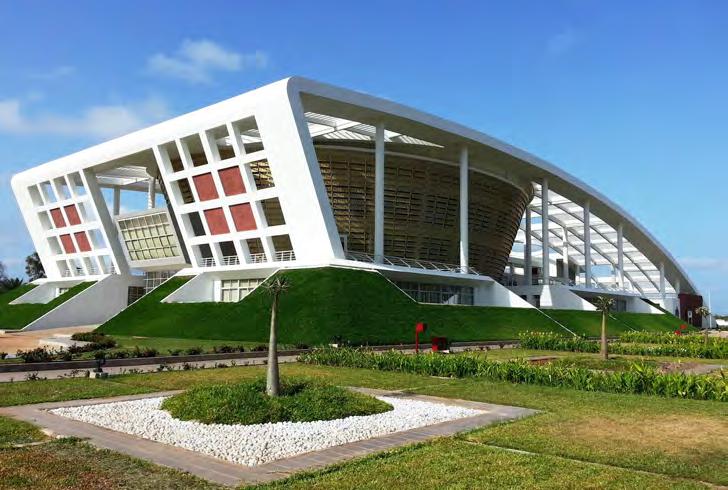
It is worth nothing that the existing legal framework addressing hate speech in The Gambia remains inadequate, leaving gaps that can be exploited for political or sectarian purposes. The Criminal Code includes provisions criminalising incitement to violence, yet there is no specific legislation that comprehensively defines and criminalises hate speech within the electoral context. This limitation has led to inconsistent legal enforcement, especially during election cycles when inflammatory rhetoric is most prevalent. The Independent Electoral Commission (IEC) possesses regulatory mechanisms to oversee campaign rhetoric, but enforcement has been inconsistent, largely due to political considerations and institutional weaknesses (International IDEA, 2021).
Similarly, the country’s media regulatory framework, particularly the Information and Communications Act, lacks explicit provisions on hate speech in digital spaces, thereby allowing unregulated online discourse to flourish (Gambia Information and Communications Act, 2009). This regulatory gap is particularly concerning given the rise of social media as a primary avenue for political engagement, where misinformation and divisive rhetoric spread rapidly.
The National Assembly, being the law-making organ of the State, has a
crucial role to play in combating hate speech through legislative reforms, oversight of electoral institutions and civic education. One of the most immediate steps it could take take is the introduction of a Hate Speech Prevention Bill that would clearly define hate speech, establish penalties for violators and provide enforcement mechanisms. Alternatively, it can also include strong provisions in the Elections Bill that is currently being considered by the relevant Committee. This legislation should mandate that political parties adhere to a code of conduct explicitly prohibiting hate speech during campaigns.
Beyond enacting legislation, the National Assembly can play a crucial role in advocating for and strengthening the IEC to effectively monitor and sanction candidates who engage in inflammatory rhetoric. Granting the IEC the authority to disqualify repeat offenders of hate speech regulations could serve as a powerful deterrent.
Whatever options it may opt for, the National Assembly must take a lead role in ensuring that electoral processes are protected from the corrosive effects of hate speech. Strengthening legal frameworks, enhancing institutional oversight and fostering a culture of political tolerance will be essential in safeguarding The Gambia’s democracy.

Keara Castaldo is Senior Election Adviser for OSCE Office for Democratic Institutions and Human Rights (ODIHR).
How does the OSCE measure the inclusiveness of elections through its monitoring?
Access to the election process by persons with disabilities varies significantly across the OSCE region. As Legislatures and election authorities consider adopting new technologies in electoral processes, they must also seize this opportunity to integrate accessibility tools. By prioritising assistive technologies and adhering to the principle of universal design, elections can become more inclusive and empower all voters to participate independently. Yet, in many countries, there remains an overreliance on legislating or facilitating “assisted” voting - where individuals rely on others to mark or cast their ballotsrather than fostering fully autonomous participation through thoughtful design and technological integration. Advocacy groups representing people with disabilities consistently highlight gaps in electoral inclusion, not only as voters but also as candidates, administrators and observers. However, the full extent of these disparities remains difficult to assess due to a lack of disaggregated data and the challenges of collecting such information while safeguarding privacy.
The OSCE – the Organization for Security and Co-operation in Europe – is an intergovernmental organisation comprising 57 participating states in Europe, Central Asia and North America and 11 partnering states in Asia, the Middle East, and North Africa, with ODIHR – the Office for Democratic Institutions and Human Rights – best known for its election observation and assistance activities and its broader mandate for promoting human rights
and democratisation in the OSCE region.
Some overarching good practices to promote inclusion always start with the foundations of the electoral rules and practices: the legal framework, how it is devised, and whether the rules and policies are adopted following a meaningfully inclusive consultative process. In the ODIHR methodology for election observation, which includes assessing the effective inclusion and participation of persons with various types of disabilities, we analyse the legal framework governing the electoral process, such as the electoral and political party legislation. We note the status of the country’s ratifications of international treaties related to democratic elections, including the Convention on the Rights of Persons with Disabilities, and whether any reservations were issued. The electoral legislation should be genuinely universal in terms of the right to vote and to stand for office, and should be in line with the United Nations covenants and other international commitments. We have observed some progress where Legislatures have repealed prohibitions on voting rights for persons with intellectual or psychosocial disability; unfortunately, many electoral laws still link voting rights to legal capacity instead of promoting assisted decision-making. Often, a legal framework affords equal rights but does not address an evident gap in opportunity: legal guarantees for universal rights of suffrage, association
and assembly do not automatically address practical obstacles faced by persons with disabilities in exercising their right to vote at polling stations, in contributing on a decision-making level within political parties and to autonomously participating at campaign events or receiving accessible or adapted electoral information from political parties and mass media. In general, we encourage an approach of considering universal design when legislating the rules and policies of the election process, including when adopting new technologies in the election process.
Logistical considerations
Outside of the legislative process, we also observe the logistical and administrative facets of the electoral process. On election day and during early voting, our observers visit polling stations and assess the implementation of the voting process, and as such we note the physical accessibility outside and inside of the polling station, with the aim to identify whether the site permits the autonomous entry by any person, including those with limited mobility and wheelchair users. We note the existence of any national directives on the physical accessibility of public buildings, such as schools, which are often designated as polling stations. We encourage proactive efforts on the national and municipal level to prevent physical barriers at election premises (including election offices, polling stations and campaign venues). We observe whether any assistive tools are available inside the polling area
to enable voters with various types of disability to mark and cast their ballots autonomously. These might include a broad range of devices and adaptations. In countries with paper-based voting, the polling station ought to include voting booths of an appropriate height and width to enable use by wheelchair users; magnifying glasses or tactile ballot guides for voters with visual impairments, as well as large-grip pencils to facilitate ballot-marking. Countries that use or are considering implementing electronic voting equipment should investigate the possibility of integrating assistive technologies, such as audio guides, voice control, sip-and-puff and other accessibility features. Voters across the globe might use various textto-speech or other assistive applications on their personal devices – and polling officials everywhere need to be aware of that fact, in case the use of smart phones inside of polling stations is regulated by law.
Election authorities should provide awareness-training to polling officials on the modifications or adaptations available in polling stations; the potential personal assistive devices that are permitted in voting booths; and how to effectively communicate and enforce the rights of voters with disabilities. Institutions can also consider civic education as well as training for political party representatives. An important practice is the collection and publication of relevant data, such as the actual number of barrier-free polling stations. The electoral authorities should continuously co-operate with organisations promoting disability rights or representing persons with disabilities, before, during and after an election process.
We consistently recommend to our participating States, their institutions and political parties of certain inclusive practices in organising elections, including legal or voluntary requirements, such as quotas, regarding the diversity of candidate lists and the underlying efforts by political parties to consider their internal practices and how they recruit members and identify candidates.
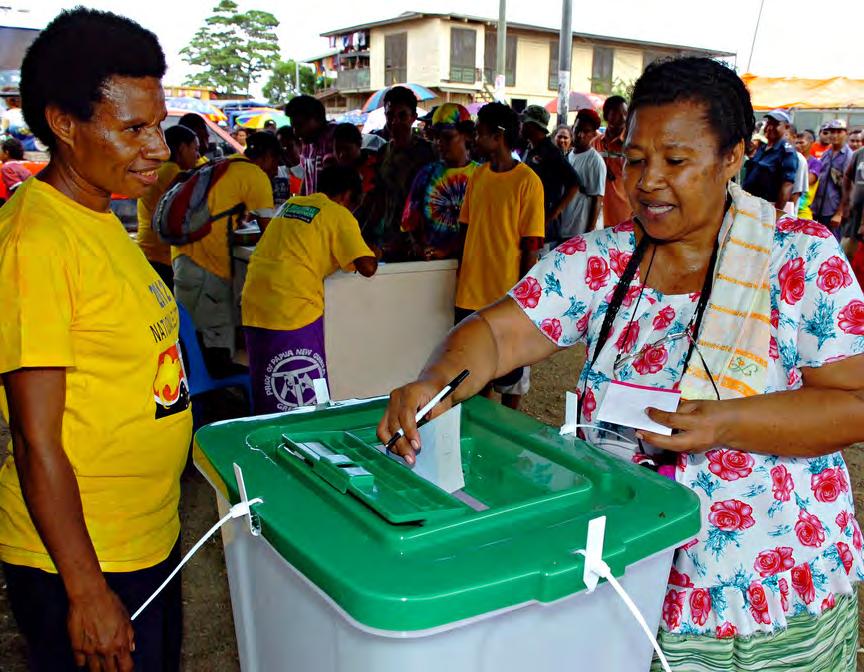
Some countries have adopted political finance rules that include subsidies for political parties to ensure the inclusiveness and accessibility of their practices and campaign materials, or to withhold public funding from those that do not. There is also a possibility of introducing subsidies directly to candidates who have additional costs related to necessary accommodations for their participation in the campaign.
When it comes to the campaign, we often observe or receive reports that there is a lack of information produced from political parties and contestants that is adaptable or delivered in accessible formats, and countries vary in their requirements for political advertising to be accessible, and whether the election or media laws contain explicit rules on this. Regulations on media could require the provision of accessible or adjustable information on the election process, such as subtitles or sign language interpretation. Web content published by state institutions and political parties should also comply with accessibility standards. There is also a role for the mass media in terms of outreach, awareness and its choices in the
diversity and visibility they afford in their election coverage.
Several countries within the OSCE region have made particular efforts to support the inclusiveness of their elections, through the activities of election management bodies or in the legal framework:
• Canada: In Canada, the national election body maintains a permanent advisory body, has developed an accessibility plan and regularly commissions research on accessibility issues in the electoral process, which is all published on its website. The agency has issued detailed accessibility criteria for establishing polling stations and information about the accessibility of individual polling stations is included in election mail to voters. The voting process in Canada also features some assistive tools, mostly for sensory impairments, where magnifiers, tactile templates for ballots, adapted candidate lists and large-grip pencils are used in polling stations. There is also some electronic equipment used at the local level.
• United States: The United States has had some major advances in the development of assistive technologies that are integrated in electronic voting machines, such as audio guides, voice control, sip-and-puff or other accessibility features. The use of electronic voting machines varies locally, with some accessibility features much more widely used than others, and there is variance in user needs and preferences.
• Lithuania: On a different track, civil society organisations s in Lithuania developed a mobile application to provide sign language interpretation and instruction for voters in polling stations, and this requires proper awareness and training of election officials to anticipate and co-operate with voters using such applications.
Many countries in the OSCE region provide some version of a tactile ballot guide.
• The Netherlands: To facilitate their use, The Netherlands provides audio-guide modules in polling stations, in addition to these guides.
• France: In France, political parties and contestants can opt for a centralised distribution of campaign materials by the relevant ministry, in order to receive reimbursement of the costs of printing campaign materials; and to take advantage of this distribution and reimbursement, the party is obligated to produce easy-to-read versions of these materials.
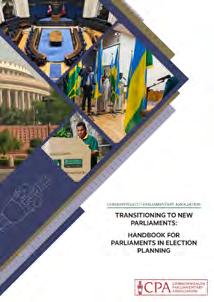
These are but a few examples of policy innovations taken in OSCE countries, many of which are in different stages of introducing accessibility policies in elections, including through the use of new technologies. It is important that Legislatures and election authorities recognise the opportunity afforded by the use and introduction of new technologies to also enhance the accessibility of the electoral process, through assistive technologies and by committing to the principle of universal design.

Further reading: OSCE/ODIHR’s Handbook on Observing and Promoting the Electoral Participation of Persons with Disabilities: www.osce.org/odihr/ elections/handbook-observing-peoplewith-disabilities
Keara Castaldo also presented virtually on the work of the OSCE/ODIHR at the 67th Commonwealth Parliamentary Conference workshop on ‘Creating inclusive elections for persons with disabilities (PwD)’. Read the workshop report in The Parliamentarian: 2024 Issue Four (p 367-369).
The Commonwealth Parliamentary Association has a proud history of encouraging participation of people with disabilities at all levels. In April 2025, the insights of Parliamentarians and governments into the views, experiences and rights of people with disabilities will be more important than ever as the third Global Disability Summit takes place in Berlin.
The Summit, hosted by the governments of Germany and Jordan in partnership with the International Disability Alliance (IDA), aims to improve the lives of people with disabilities by bridging the gap between disability inclusion and development co-operation: areas that are too often seen as separate.
The need for them to be joined up is clear. Of the world’s 1.3 billion people with disabilities, 80% live in low and middle-income countries. People with disabilities die up to 20 years earlier than people without disabilities and face inequities arising from stigma, discrimination, poverty and exclusion from education and employment. Children with disabilities are 49% more likely than their peers to miss out on going to school. Intersecting with this, factors such as ethnicity, sex, gender, sexual orientation and age can result in further marginalisation. Development that doesn’t take this into account leads to poorer outcomes overall.
The Global Disability Summit (led by IDA and first held in 2018, co-hosted with the UK and Kenya, then again in 2022, with Norway and Ghana) provides a unique opportunity to
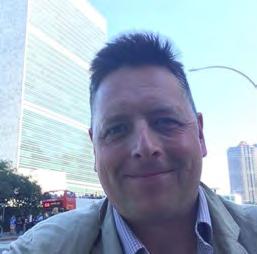
Ross Gilligan is Parliamentary and Government Relations Adviser for Sightsavers. Bridging
bring together global, regional and national stakeholders in the public, private and voluntary sectors, with shared goals and visions for disabilityinclusive development. Attendees are encouraged to register specific inclusion commitments, which can be publicly viewed via the GDS website.
UK inclusion progress
In recent months, the UK Foreign, Commonwealth and Development Office’s approach to disability inclusion has been under the spotlight. This is due to an inquiry by the UK House of Commons International Development Committee and their subsequent report published last year before July’s UK General Election, and the new UK government’s response to it in January 2025.
Much of the inquiry and the report inevitably focused on the impact of cuts to the Official Development Assistance Budget and the 2020 merger of the former Department for International Development with the Foreign and Commonwealth Office (two UK Government departments). However, the Committee highlighted a number of areas of progress over the past decade, as well as opportunities for the UK to restore its position as a world leader in the area of disability-inclusive development.
The FCDO’s Disability Inclusion and Rights Strategy has been recognised as a milestone achievement in improving the inclusivity of the UK development portfolio as whole, and its latest version will be launched at this April’s Global Disability Summit. The MPs’ report also highlighted the FCDO’s flagship Disability Inclusive Development (DID)
programme, which is overseen by Sightsavers in its role as lead partner in the Inclusive Futures consortium.
UK MPs have also backed a twintrack approach, providing targeted specialist support on disability as well as mainstreaming support across all sectors and priority areas of development policy and practice, including education, health and climate change. In its response, the UK Government noted that prior to the first Global Disability Summit in 2018, only 18% of its bilateral aid was marked as being principally or significantly disability-inclusive, but this has increased to 35%.
There is clearly a considerable way to go. However, this year’s Global Disability Summit offers an opportunity for the new UK Government and all donor nations to make development 100% disability inclusive, as well as share and implement good practice in other areas highlighted not just by MPs in the UK but by the disability movement globally. These include data collection; engagement of people with disabilities in the design and implementation of development programmes; improved safeguarding; and disability-inclusive humanitarian and climate change responses.
The call for a more equal
At Sightsavers, we work in more than 30 countries to protect sight, eliminate diseases and promote disability inclusion, including by calling for disability rights to be upheld through our Equal World campaign.
The campaign highlights the importance of people with disabilities – particularly young people and
women – having full involvement and participation in the decision-making processes that affect their lives. At the Global Disability Summit, this means they need to be consulted and considered in new commitments made towards disability-inclusive development.
The Equal World campaign also calls for high-level Ministerial and parliamentary attendance at the Summit, and for commitments to be clear, measurable and actionable, backed by properly funded action plans with mechanisms for accountability, and clarity on who is responsible for implementation.
If the global community is serious about leaving no one behind, achieving these campaign objectives is essential. We warmly welcome the role that the CPA, through its Commonwealth Parliamentarians with Disabilities (CPwD) network, together with Parliamentarians across the Commonwealth can play in ensuring the success of the Global Disability Summit, and look forward to working together on these shared goals towards April and beyond.

For more information about Sightsavers and the Equal World campaign please visit: www.sightsavers.org and www.campaigning.sightsavers.org
For details of the Global Disability Summit visit www.globaldisabilitysummit.org
Commonwealth Perspective
The Commonwealth, a family of 56 countries bound by shared history and values, is a vibrant mosaic of languages and cultures. Across this rich diversity, Parliaments stand as vital pillars of democracy, working to bring people together and ensure that every voice is heard. In countries with multiple official languages, bilingual or multilingual Parliaments are far more than just bureaucratic necessities - they are living embodiments of inclusion, fairness and unity.
This article takes a closer look at why these Parliaments matter, sharing inspiring examples from across the Commonwealth and celebrating the profound ways multilingualism strengthens our democracies and communities.
While the English language is often referred to as a ‘binding thread’ across the Commonwealth, the reality is that this family of nations is home to an extraordinary variety of languages and dialects. From South Africa, which celebrates 11 official languages including isiZulu, Afrikaans and English, to Canada, where English and French share equal footing under the Official Languages Act of 1969, linguistic diversity is a defining feature. In these multilingual contexts, Parliaments have a vital responsibility to embrace and navigate this diversity, ensuring that every citizen can meaningfully engage with their democracy.
Bilingual and multilingual Parliaments are essential for safeguarding the rights of linguistic minorities and promoting equal access to governance. Imagine a citizen hearing their preferred language in parliamentary proceedings - it sends a powerful message that their identity and voice truly matter. When people can follow debates, understand legislation and access public information in a language they deeply connect with, it builds trust in democratic institutions. This inclusivity doesn’t just inform citizens; it empowers them, fostering a sense of belonging and encouraging greater engagement with the democratic process. Ultimately, such efforts help knit together the fabric of diverse societies, creating spaces where everyone feels heard and valued.
Practices
Multilingual
Several Commonwealth Legislatures have adopted innovative strategies to ensure linguistic inclusivity in their parliamentary practices. Below, we highlight four case studies:
Kenya: Translating Parliamentary Standing Orders into Swahili
The Parliament of Kenya has taken a significant step towards linguistic inclusivity by translating its Standing Orders into Kiwahili, one of the country’s official languages and widely spoken by its citizens. This landmark initiative was undertaken to not only align with the assessment undertaken by the Parliament using the CPA Recommended Benchmarks for Democratic Legislatures, but also adheres to Article 118 of the Constitution of Kenya, which requires Parliament to facilitate public participation and involvement in its legislative business. This initiative was also supported by experts from the University of Nairobi, whose faculty members contributed to developing the Kiswahili and bilingual versions of the National Assembly’s Standing Orders. The translation process involved a dedicated task force comprising Kiswahili experts, who worked meticulously to ensure accuracy and cultural relevance. The translated Standing Orders are available on the official Parliament of Kenya website, providing citizens with direct access to parliamentary
“ In countries with multiple official languages, bilingual or multilingual Parliaments are far more than just bureaucratic necessities - they are living embodiments of inclusion, fairness and unity.”

procedures in Kiswahili. This effort underscores the Parliament's commitment to fostering greater public engagement by making legislative processes more comprehensible to Kiswahili-speaking citizens.
Canada’s Parliament is a global leader in promoting bilingualism. The Canadian Official Languages Act mandates that all federal institutions, including Parliament, provide services in both English and French. Simultaneous interpretation is available during parliamentary debates and official documents, including Hansard transcripts and Committee reports, are published in both languages.
The Canadian Parliament also demonstrates a proactive approach to supporting bilingualism among its Members of Parliament. Language training programmes are available to Parliamentarians, enabling them to communicate effectively in both official languages. These programmes
are also extended to parliamentary staff, ensuring that the commitment to bilingualism is embedded across all levels of governance. This inclusivity not only helps Parliamentarians and staff communicate seamlessly but also reflects Canada’s dedication to fostering a culture where linguistic duality is respected and celebrated.
South Africa’s Parliament exemplifies how multilingualism can be embedded in legislative processes. Recognising 11 official languages, the Parliament offers interpretation services to accommodate diverse linguistic groups. Members of Parliament are encouraged to speak in their preferred language during debates, fostering an inclusive environment.
The ‘Taking Parliament to the People’ (TPTTP) initiative exemplifies the nation's commitment to facilitating direct interaction between citizens and their representatives. This programme travels to various regions, often
focusing on more remote areas to ensure broad public participation. A key component of TPTTP is the provision of language services to accommodate the country's linguistic diversity. Interpreting services are integral to the programme, enabling effective communication during public engagements. For instance, during the Climate Change Bill public hearings, Parliament employed various channels, including in-person hearings and community engagement activities, to facilitate public input, underscoring the public’s active interest and participation. These efforts ensure that citizens can engage in the legislative process in languages they understand, fostering a more inclusive and participatory democracy.
The Senedd (Welsh Parliament) exemplifies a robust commitment to bilingualism in governance. Welsh and English have equal status in the Senedd, and interpretation services are
provided during debates. Under the Senedd’s current Official Languages Scheme, all documents, including legislation, are published bilingually, ensuring accessibility for Welsh speakers.
The Senedd’s commitment to the Welsh language extends beyond its walls and is embedded in its external communications. This includes requiring, for example, that the Senedd must respond to any contact via social media in the official language that was originally used, and that individual members of Senedd Commission staff should record bilingual messages on their telephone answering machines. This approach demonstrates how Legislatures can play a pivotal role in revitalizing languages that might once have been the primary language of a jurisdiction but have come to be spoken by a minority of the population over time.
Bilingual and multilingual Parliaments contribute to more than just effective governance. They also yield significant social, cultural and economic benefits:
1. Enhanced Democratic Participation: Linguistic inclusivity ensures that all citizens, regardless of their preferred language, can engage with legislative processes. This inclusivity reduces barriers to participation and empowers marginalized communities to voice their concerns. For example, Canada’s bilingual parliamentary practices enable French-speaking communities in Québec and New Brunswick to participate fully in national and provincial governance.
2. Strengthening Social Cohesion:
Recognising and respecting linguistic diversity fosters a sense of belonging among citizens. When Parliaments operate bilingually, they signal a commitment to unity in diversity. South Africa’s multilingual approach,
for instance, has been instrumental in promoting reconciliation and national unity in a post-apartheid era.
3. Preserving Cultural Heritage:
Bilingual and multilingual Parliaments play a crucial role in preserving and promoting cultural heritage. By prioritising the use of minority and indigenous languages, these institutions contribute to the revitalisation of linguistic traditions. The Senedd’s efforts to promote the Welsh language exemplify how Parliaments can serve as custodians of cultural heritage.
While the benefits of bilingual and multilingual Parliaments are clear, implementing such systems is not without challenges. Among the Commonwealth Parliamentary Association's membership of almost 180 Legislatures, many Parliaments operate under significant resource constraints - be it tight financial

budgets, insufficient personnel or a lack of technical infrastructure. These realities can make it difficult to provide comprehensive interpretation and translation services, particularly in contexts where multiple languages require simultaneous support. In addition, logistical complexities - such as hiring and training skilled interpreters or producing bilingual documentation - can strain already overstretched resources. Resistance to change can also arise, with some questioning the necessity or feasibility of multilingual practices. However, these challenges also present opportunities for innovation.
Technology offers a promising avenue for overcoming linguistic barriers, bringing innovation and efficiency into the heart of multilingual governance. Advances in real-time translation tools, Artificial Intelligence and digital platforms have the potential to transform how Parliaments operate. For example, AI-powered translation tools can significantly reduce costs while maintaining high standards of linguistic accuracy - a vital advantage for Parliaments facing resource constraints. Moreover, these technologies come with an added opportunity: when AI models are trained in a multilingual manner, they avoid the biases often found in systems built predominantly on English or other dominant languages. This approach not only broadens the scope of linguistic inclusivity but also leads to more equitable technological advancements. For instance, real-time translation systems that effectively process a diverse range of languages, including indigenous and minority ones, ensure that no community is left behind.
Some Parliaments are already exploring tools like AI-enhanced captioning for debates or digital platforms that provide instantaneous document translation, paving the way for wider accessibility and engagement. These innovations underscore the importance of thoughtful investment in technology that mirrors the linguistic and cultural richness of the societies it serves.

Capacity-building initiatives are equally critical. For instance, the New Zealand Parliament, known for its record of Māori representation, has implemented specific training programmes to promote the use of te reo Māori (the Māori language) among Parliamentarians and staff. These initiatives not only ensure that linguistic inclusivity is a practical reality but also honour and celebrate New Zealand's unique cultural heritage. Moreover, fostering partnerships with linguistic and cultural organisations can help Parliaments develop best practices tailored to their unique contexts, ensuring that the richness of their societies is reflected in their governance. Notably in New Zealand, the Parliamentary Counsel Office/Te Tari Tohutohu Pāremata works with the Māori Language Commission/Te Taura Whiri i te Reo Māori), which leads in Māori language planning.
Bilingual and multilingual Parliaments are vital for fostering inclusive, equitable and effective governance in linguistically diverse jurisdictions. By embracing linguistic diversity, Parliaments not only fulfill their constitutional obligations but also strengthen democratic institutions,
promote social cohesion and preserve cultural heritage.
As the Commonwealth continues to champion values of democracy, human rights and cultural diversity, its member states have an opportunity to lead by example. By investing in bilingual and multilingual parliamentary practices, they can demonstrate that linguistic inclusivity is not just a matter of policy but a fundamental pillar of participatory democracy. Through collaboration, innovation and a shared commitment to equity, Commonwealth Parliaments can ensure that every voice - regardless of language - is heard and valued.
International Mother Language Day has been recognised by UNESCO since 1999 and the UN General Assembly since 2002, and it takes place on 21 February each year.
The idea was the initiative of Bangladesh and day promotes “the preservation and protection of all languages used by peoples of the world." Today, there is growing awareness that languages play a vital role in development, ensuring cultural diversity and intercultural dialogue.
This article was written by James Pinnell, Deputy Head of Programmes at the CPA. Views and opinions expressed in this article are his own. Research and references in this article were powered by Artificial Intelligence (AI).
On 16 October 2024, UK backbencher, Hon. Kim Leadbeater, MP introduced the Terminally Ill Adults (End of Life) Bill 2024-25 to the UK House of Commons which aims to legalise assisted dying in England and Wales, having been drawn as first on the list in the Private Members’ Bill ballot for the 202425 session of the UK Parliament. At present, laws throughout the UK prevent people from asking for medical help to die.
The Bill had its Second Reading on 29 November 2024 with UK Members being given a free vote on whether to allow it to proceed to the next stage. The free vote meant that Members could make their own decision rather than following party instructions with the UK Government remaining impartial on the issue. The historic vote saw 330 MPs support the Assisted Dying Bill with 275 rejecting it. Months of detailed scrutiny and further votes in the UK House of Commons and House of Lords will now be required before the Bill could potentially become law. 23 MPs on a cross-party basis have been appointed to House of Commons Public Bill Committee which will
review the legislation line-by-line and suggest amendments before it goes any further. The Committee Members include 14 supporters of the Bill - including two Government Ministers - and nine opponents. The Committee will hold public hearings and take evidence from experts before proposing amendments to the Bill, before its return to the House of Commons due on 25 April when all MPs will have a chance to debate and vote on the changes proposed by the Committee. The Bill would also face further scrutiny in the House of Lords.
A separate Bill is under discussion in Scotland where Liam McArthur, MSP drafted the Assisted Dying for Terminally Ill Adults (Scotland) Bill. The Bill is being considered by the Health Committee in The Scottish Parliament ahead of an initial vote by MSPs, which is expected in 2025. There is some debate as to whether the proposed legislation went beyond the limits of Holyrood’s powers and was a matter for Westminster.
The issue of assisted dying is not currently on the agenda at the Northern Ireland Assembly; however, the Isle of Man and Guernsey are both discussing proposals for a new law. The States Assembly of Jersey approved plans to allow assisted dying for those with a terminal illness in May

2024 with 32 Members voting in favour while 14 voted against.
In Canada, voluntary euthanasia is legal where it is called ‘medical assistance in dying’. It can be provided by a doctor or nurse practitioner, either in person or through the prescription of drugs for self-administration. Medically assisted dying accounted for 4.7% of deaths in Canada in 2023.
New Zealand’s End of Life Choice Act legalised assisted dying in November 2021 and allows adults in their final months of life to request assistance from a medical professional. Assisted dying is legal in some parts of Australia but the law differs across states.
Switzerland has allowed assisted suicide since 1942 with its worldfamous Dignitas facility accepting foreign patients as well as Swiss nationals.
As reported in The Parliamentarian (2024 Issue Four), the Online Safety Amendment (Social Media Minimum Age) Bill 2024 was passed by both Houses of the Australian Parliament on 29 November 2024 and has received international media coverage. The new Act is a world-first by introducing a legal minimum age of 16 to have an account on age-restricted social media platforms. The legislation is not the first attempt globally to limit social media use by children, however, the Australian law involves the highest age limit set by any country and does not include exemptions for existing users or those with parental consent.
The Minister for Communications, Hon. Michelle Rowland, MP said that the Act was intended to enable young people to use the internet in a safer and more positive way and would ‘signal a set of normative values that support parents, educators and society more broadly.’
The legislation does not specify which social media platforms will be banned, and this will be decided by the Minister with advice from Australia’s e-Safety Commissioner – whose organisation will help to enforce the rules. According to media reports,
gaming and messaging platforms will be exempt from the new regulations as well as sites that can be accessed without an account (e.g. YouTube).
The ban on social media - which will not take effect for at least 12 monthscould see tech companies fined up to A$50m ($32.5m; £25.7m) if they do not comply with the regulations. However, critics say that there are questions over how the ban will work in practice and the implications for privacy of individuals. Recent polling in Australia shows that a majority of the public support the legislation.
Proceedings in New Zealand’s Parliament were brought to a temporary halt on 14 November 2024 by Members of Parliament performing a ‘haka’ in the Chamber. The Speaker called a temporary halt to parliamentary proceedings as Opposition MP Hana-Rawhiti MaipiClarke began the traditional dance in protest as her party was asked if they supported the Bill.
The Treaty Principles Bill was introduced in Parliament for a preliminary vote amid anger from those who say it seeks to reinterpret the country’s founding Waitangi Treaty with Māori people.
The protest in Parliament was followed by a nine-day-long hikoi (or peaceful march – a tradition of the Maori) which drew an estimated 42,000 protesters as it concluded outside the New Zealand Parliament in Wellington.
The ACT Party, who introduced the Bill, argue that there is a need to legally define the principles of the 1840 Treaty of Waitangi, which has been fundamental to community relations in New Zealand and has been woven into the country’s laws in an effort to redress the wrong done to Indigenous Māori communities during colonisation. While approx. 18% of New Zealand’s population consider themselves to be Māori, according to the most recent census, many remain disadvantaged compared with the general population when assessed through markers such as health outcomes, household
income, education levels and incarceration and mortality rates.
Critics of the Bill, however, say the legislation will divide the country and lead to the unravelling of muchneeded support for many Māori.
The Treaty Principles Bill will now be sent to a Select Committee for a sixmonth public hearing process.
On 10 December 2024, the Turks and Caicos Islands Constitution (Amendment) Order 2024 was formally signed into law by the Governor of Turks and Caicos Islands, H.E. Dileeni Daniel-Selvaratnam
The Premier of Turks and Caicos, Hon. Charles Washington Misick, MHA said that the new law marks a significant milestone for the islands saying ‘This modernisation effort reinforces the protection of our citizens’ fundamental rights and establishes a clear framework for the functioning of government branches. This is a defining moment for a brighter, more inclusive future for us all.’ Included in the newly reformed constitutional and governance framework are provisions to enhance democratic representation, governance and domestic decisionmaking authority.
There were dramatic scenes in The Bahamas Parliament on 4 December 2024 when an Opposition MP Hon. Shanendon Cartwright threw the parliamentary mace out of the window following a heated debate. Proceedings were suspended as the debate on a police corruption scandal escalated and the Opposition Member feeling that he was not being allowed to speak. As a result, he rushed to the front of the Chamber to grab the symbolic parliamentary mace and threw it out of an open window.
With the parliamentary proceedings still being broadcast on a government TV channel, the Speaker of the Parliament, Hon. Patricia Deveaux called for police to eject the Opposition Members and to retrieve the mace.
The debate came after US Federal prosecutors charged several highranking Bahamian police officials with facilitating the flow of drugs into the country in exchange for bribes. Outside Parliament, dozens of protesters gathered to protest against the police. The incident mirrored an occasion in 1965, when the same thing happened in the Bahamas Parliament when the then Leader of the Opposition

threw the parliamentary mac out of the window during a time of political change (an event that became known as ‘Black Tuesday’).
Following the announcement on 31 December 2024 that two-term Prime Minister of Trinidad and Tobago, Hon. Keith Rowley, MP would be stepping down in August 2025, a new candidate for the role has been selected. The current Minister of Energy and Minister in the Office of the Prime Minister, Hon. Stuart Young, MP emerged as the choice of the ruling People’s National Movement (PNM) and is scheduled to become Trinidad and Tobago’s 8th Prime Minister since independence in August 1962.
Stuart Young first entered the 11th Parliament in September 2015 and has held several Ministerial roles. He had been a practising Attorney-at-law since 1998. He is a graduate of the University of Nottingham in the UK and has experience in the commercial, banking, insurance and industrial relations sectors.
Trinidad and Tobago is in a State of Emergency following an upsurge of violence and murders, reaching 630 in 2024. The Parliament of Trinidad and Tobago passed a motion to extend the State of Emergency for a period of three months from 12 January 2025.
It has been announced that Sarah Clarke, the first woman to be appointed to the historic role of Black Rod in its 670-year history, will leave the UK Parliament in 2025 after a momentous seven-and-a-half years in post. Appointed to serve as The Lady Usher of the Black Rod in November 2017 by the late Queen Elizabeth II, Sarah and her team have delivered many major ceremonial events in the Palace of Westminster including six State Openings of the UK Parliament (including the Opening in 2021 which was undertaken with COVID distancing measures) as well as major ceremonial for the Lying-in-State in Westminster Hall of the monarch followed by the start of the procession for the State
Funeral in September 2022 and a role in the Coronation of HM King Charles III and HM Queen Camilla in May 2023. As well as serving two Monarchs, working with five UK Prime Ministers and being in post for two UK General Elections, Sarah has also presided over seven prorogations of the UK Parliament (the act used to mark the end of a parliamentary session), four formal addresses by visiting heads of state and the historic joint address to both Houses by President Zelensky of Ukraine in Westminster Hall in February 2023. The role of Black Rod also includes responsibility for maintaining order and controlling access to the House of Lords.
Reflecting on her time in the role, Sarah said: “It has been the greatest honour and privilege of my life to serve as Black Rod during what has been a most extraordinary period. I am hugely grateful to the many exceptional people I have worked alongside during my term of office, whose support in enabling me to carry out my duties has been invaluable.”
Below: Black Rod, Sarah Clarke takes part in the Prorogation ceremony in the UK House of Lords in September 2019.

The announcement of Canada’s Prime Minister, Rt Hon. Justin Trudeau, MP on 6 January 2025 that he will step down after nine years in office and the subsequent declaration of former head of the central banks of both Canada and England, Mark Carney as a candidate in the Leadership race for the Liberal Party of Canada has produced an interesting procedural question. As Mark Carney is not a current Member of the Canadian Parliament, there is a possibility of a Prime Minister being appointed who cannot speak in Parliament.
According to parliamentary experts in Canada, Leaders of political parties can head the government as Prime Minister without representing a riding (or constituency), although they would not be able to sit or debate during parliamentary sessions. However, they would be able to enter and observe parliamentary proceedings from the gallery.
Occasionally, Prime Ministers or Ministers who are not able to participate in the business in the House (if they are overseas or due to illness) can delegate the debate and response to another senior Member of their party. This is something that several party leaders have done and so a party leader without a seat could do the same.
By convention, it would be expected that the Leader of a political party who did not have a seat in Parliament would stand in a by-election or at the next federal election at the earliest opportunity.
According to CPA Canada Regional Secretary, Jeremy Le Blanc, there is a relatively recent precedent of a similar situation. In 1984, Rt Hon. John Turner became Canadian Prime Minister after succeeding Rt Hon. Pierre Elliot Trudeau (the current Prime Minister’s father), as Leader of the Liberal Party. Mr Turner had previously been an MP and a Cabinet Minister but had been out of politics for almost a decade. Mr Turner was appointed as Prime Minister on 30 June 1984, and he asked for a dissolution of Parliament on 9 July. His party was defeated in the
subsequent election in September, but Mr Turner won a seat and served as Leader of the Opposition for the next six years. However, he served as Prime Minister for only 79 days.
The new Leader of the Liberal Party is due to be announced on 9 March 2025 and will automatically become Prime Minister of Canada as the Leader of the largest party in government. A Canadian Federal Election must take place by 20 October 2025, but an early election could be called by the new Leader.
As reported in The Parliamentarian 2024 Issue Three, the Canadian Parliament has responded in various ways to allegations of attempts by foreign state and non-state actors to influence Canada’s democratic institutions.
On 28 January 2025, the Canadian Foreign Interference Commission released its Final Report ‘Public Inquiry into Foreign Interference in Federal Electoral Processes and Democratic Institutions’ following a 15-month investigation that was inspired by allegations that foreign states had attempted to interfere in democratic institutions and the electoral process
in the 2019 and 2021 Canadian Federal Elections. The Commission’s report contains 51 recommendations including several that do not require legislative change and could be put in place before the next Federal Election. The Commission found that foreign interference is not new, but that it is increasing, and the means and methods are changing. Commissioner Marie-Josée Hogue said: “We have conducted a thorough and rigorous examination of foreign interference in Canada’s electoral processes and democratic institutions. I believe that our investigation has enabled a better public understanding of foreign interference in Canada, and how the government attempts to counter it.
Thus far – and this is one of my most important observations – Canada’s democratic institutions have held up well and remained robust in the face of attempted foreign interference. That said, foreign interference will never be completely eradicated, and it will always be necessary to be vigilant and fight against it. Democracies around the world are under attack from all sides, and the technological resources available to malicious actors are multiplying. All of us who live in Canada must confront these challenges, together.”
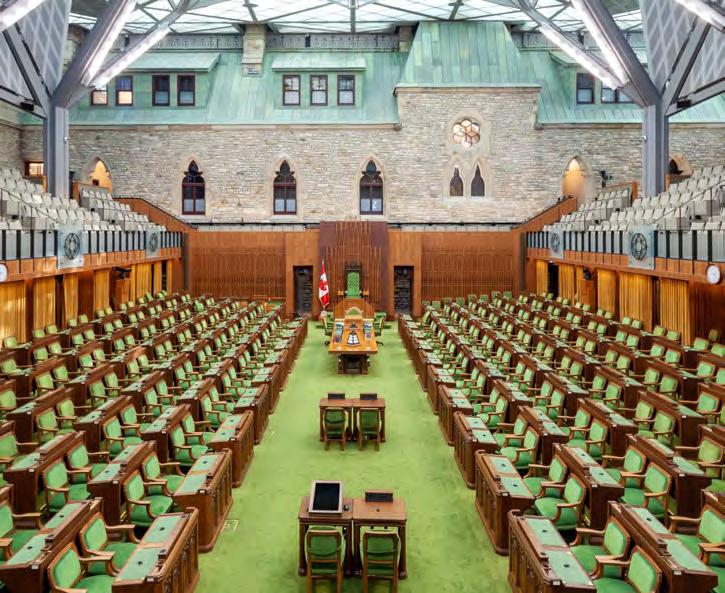
AS THE NEW SOUTH WALES LEGISLATIVE COUNCIL MARKS ITS BICENTENARY, A NEW BOOK EXAMINES ITS ROLE IN LEGISLATION, PROCEDURE AND DEMOCRATIC REPRESENTATION.
‘Parliamentary Democracy at Work: Essays on the New South Wales Legislative Council’ - Editors: David Blunt, AM and Dr David Clune, OAM (Publishers: The Federation Press, January 2025, ISBN 9781760025199).
Professor Gabrielle Appleby is Professorial Fellow of the Pro-ViceChancellor Society and the University of New South Wales (UNSW) Sydney, a Constitutional Consultant and Clerk at the Australian House of Representatives.
The publication of ‘Parliamentary Democracy at Work: Essays on the New South Wales Legislative Council’ (Federation Press, 2024) marks two milestones in the New South Wales Legislative Council’s history. The first is the commemoration of the bicentenary of the Council in 2024. The second is the retirement of its long-serving Clerk, David Blunt. It is entirely appropriate that his retirement is marked by the publication of a volume that chronicles and celebrates the two centuries of work of the Legislative Council – defending and promoting its role in the practice of New South Wales democracy while looking to the future of democracy and the role of a modern Parliament – and showcases the
breadth and depth of thinking of those working for and within the Legislative Council.
As editors David Blunt and David Clune say in the introduction to the volume, the Legislative Council is now something of a ‘pacesetter’ in Australian Upper Houses. This is amply demonstrated in the volume, and can be, I believe, traced in no small part to the culture of the Council. Under David Blunt’s leadership, and those before him, the staff of the New South Wales Legislative Council are engaged, dynamic, self-reflective and committed to understanding, protecting and developing the role of the House in the State’s constitutional system. Now, of course, there is room for improvement, and areas for improvement are outlined in the book. However, the fact that there is contest, debate and scholarship reflects the culture of the Legislative Council: these issues are identified, and they are worked through between staff and Members in a robust and informed way, with respect for research-informed reform and fair and transparent process.

One of these areas of future change is the engagement with First Nations people in the State. The Legislative Council’s current President, Hon. Ben Franklin, MLC refers in his chapter (chapter 6, pages 67-68) that there have been a number of commendable efforts to engage with First Nations by the Council, including through commissioned artworks,
and also through truth-
telling,
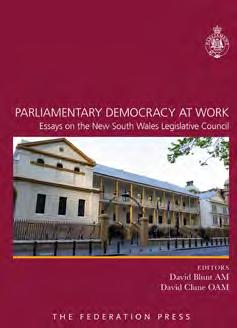
linking the expansion of settlement and the experience of that on the Gadigal People of the land on which the Council stands, during its establishment. Working with the local Aboriginal communities is an important expression of localised truth-telling.
My question then, for the future reflection of those working in the Legislative Council, is where to now for this engagement. In Chapter 12 of this book, by former Legislative Council President, Hon. John Ajaka, there is an important set of reflections from which to start. By considering the introduction of the Aboriginal Languages Bill 2017, both the significance of the substance of the Bill itself in facilitating and supporting the reawakening, nurturing and growth of Aboriginal languages in New South Wales, as well as the innovative procedure that was adopted during the passage of the Bill to allow for a message stick ceremony to be performed by Aboriginal elders, and the ongoing display of the Message Stick that was used.
At page 151, Ajaka rightly argues: ‘From this experience, it is clear that Westminster traditions can be respected while Parliaments can still be a platform that is open to innovation and culturally appropriate practices and symbolism. In sum, it is a matter of evolving in a positive way the traditions and practices of the chamber.’
The Aboriginal Languages Act was an important milestone, but there is more to be done within the modern New South Wales constitutional system and democratic practice to
meaningfully accommodate the First People and nations. I agree with Ajaka, that the Westminster traditions can adapt to these changes. In 2024, the New South Wales Government appointed three Aboriginal treaty Commissioners, who commenced their work this year. A future treaty raises the need for First Nations political representation and voice in the State. How the Legislative Council might engage with State-level Aboriginal representative bodies and how the Council might accommodate First Nations’ views into its law-making and scrutiny functions, is a new chapter for the functioning of democracy in New South Wales. I look forward to seeing how this incredibly able chamber will respond to that future challenge.
Professor Rodney Smith is Professor of Australian Politics at the University of Sydney where he primarily teaches Australian politics and public sector ethics and corruption.
From my perspective, this book is a very welcome addition to the literature on Australian Parliaments and Legislatures more generally. It adds to our knowledge of the New South Wales Legislative Council in two important ways. First, it pays detailed attention to the key rules of the parliamentary game – the procedural, legal and constitutional constraints and opportunities that govern the politics of the Legislative Council. There are, for example, five chapters on orders for State papers and six chapters on Committee powers and processes. These rules are often obscure to political scientists and to our students. The book does much to illuminate them.
Second, ‘Parliamentary Democracy at Work’ tells us something about the politics behind the use of these rules and the reforms that produced them, although this is a less pronounced theme. Questions of how and by whom the parliamentary rules have
been used, what drove parliamentary reforms, and how those reforms have been sustained and defended are core interests for political scientists. The book’s index provides valuable clues to answering these questions. There are more entries on Opposition and Crossbench MLCs than on Government MLCs, suggesting that the combined forces of the Opposition and Crossbench MLCs have usually driven reforms and done most to take up the opportunities provided by new rules.
Some Government MLCs do score a relatively high number of mentions in the book. Tellingly, this is because of their role as Leaders of the Government in the Legislative Council, charged with negotiating the passage of government legislation from a minority position and with responding to Opposition and Crossbench challenges to Executive power.
Two chapters are particularly helpful for understanding the politics of the Legislative Council. The first is David Clune’s ‘The Legislative Council of New South Wales: A progressive conservative institution’. ‘Progressive conservative’ is a useful expression that captures much of the dynamic of the Legislative Council since it became a popularly elected house in 1978. The reforms since then have been progressive, in that they have enhanced democracy in New South Wales. At the same time, they have been conservative, in that they have developed organically over time, rather than following an original blueprint.
Examples of organic changes include the development of the Committee system, the extension of orders for papers, and the Legislative Council’s recent moves towards stronger scrutiny of delegated legislation.
The second chapter is Lynn Lovelock’s ‘The Membership of the New South Wales Legislative Council Crossbench and its implications for responsible government, 1999-2007’. This chapter points to the interplay between electoral rules-based or proportional representation and the Legislative Council’s multi-party composition. Had different electoral rules resulted in a Legislative Council dominated by the two major parties, ‘Parliamentary Democracy at Work’ would almost certainly be a slimmer volume. It is worth remembering that in 1978, both Labor Premier Neville Wran and Liberal Opposition Leader Eric Willis thought the new elected Legislative Council would continue two-party politics as usual. This book shows how the Council has instead developed into a powerful and dynamic democratic institution.
Below and opposite page: The book launch was held in the historic Jubilee Room attended by the current President of the New South Wales Legislative Council, Hon. Ben Franklin, MLC, the co-editors of the book, David Blunt and David Clune as well as many other contributors.
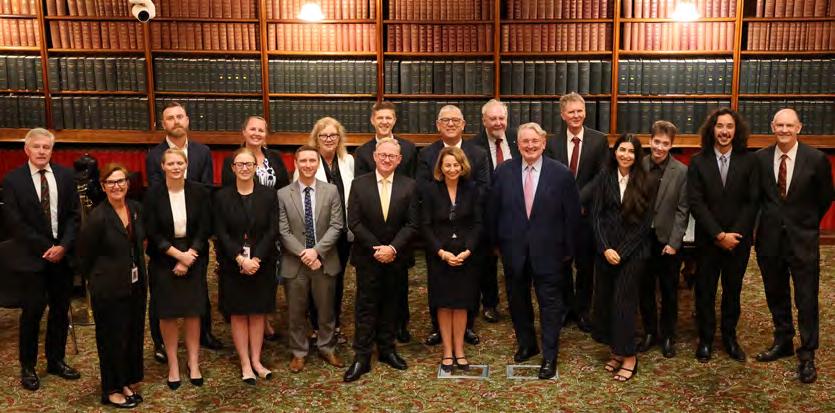
First woman Cabinet Minister in Botswana and former CPA Botswana Branch/CPA Africa Chairperson.
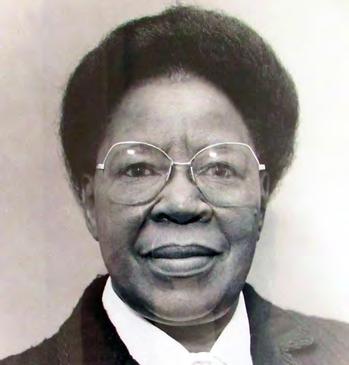
Dr Gaositwe K. T. Chiepe, who has died at the age of 102, was a leading figure in Botswana where she was instrumental in establishing the education system as well as serving in Government and representing the country as High Commissioner and Ambassador in several European nations.
Gaositwe Chiepe was born in Serowe in 1922 in the former Bechuanaland Protectorate (now Botswana) where she went to primary school and then proceeded to Tigerkloof in South Africa for her secondary education having received a scholarship as the best student in the country. When her father died during her youth, her extended family wanted her to leave school and get married, however, her mother insisted that she continue her education, a fact that Gaositwe Chiepe later acknowledged as a key factor in her successful career. Following this, she attended the University of Fort Hare, where she obtained a Bachelor of Science degree and postgraduate Diploma in Education. In 1958, she went to the University of Bristol in the UK to undertake a Master’s degree. One of her primary interests was in education and her university thesis examined the role of education in Botswana with a comparative study of the UK, Yugoslavia and Uganda. Gaositwe Chiepe was appointed as the first woman Education Officer of
Botswana (serving as Assistant from 1948 to 1953; Education Officer from 1948 to 1953; Education Officer with administration and inspectorate duties from 1953 to 1962; Senior Education Officer from 1962 to 1965; Deputy Director of Education from 1965 to 1967; and Director of Education from 1968 to 1970). She implemented reforms to the education system in Botswana and campaigned for better opportunities for young people as well as free education for all. She was the National Deputy Commander of the Girl Guides in 1953, 1957 and 1963. Gaositwe Chiepe was appointed to the post of High Commissioner to the United Kingdom and to Nigeria and as Ambassador to West Germany, France, Denmark, Norway, Sweden and the European Economic Community (EEC) between 1970 and 1974. She actively participated in negotiations with the EEC for Lome I, Lome II and Lome IV (a trade agreement between the EEC and 71 African, Caribbean and Pacific ACP countries) and was Chair of the Organization of African Unity’s Council of Ministers.
In 1974, Gaositwe Chiepe was appointed as the first female Cabinet Member in Botswana, having become a Specially Elected MP through a party list of the ruling Botswana Democratic Party. She was popularly elected to Parliament from the Serowe South constituency in the Central District of Botswana in a by-election in 1977. Her roles included Minister of Commerce and Industry (1974 to 1977); Minister of Mineral Resources and Water Affairs (1977 to 1984); Minister of External Affairs – Foreign Minister (1984 to 1994); and Minister of Education (1994 to 1999). During this period, she became involved in the work of the Commonwealth Parliamentary Association, becoming Chair of the CPA Botswana Branch in 1981 and Chair of the CPA Africa Region (1981 to 1983).
In 1999, Gaositwe Chiepe retired from government roles after nearly 30 years of high-level positions. She received honorary doctorates from the University of Bristol in the UK, DePaul University in the United States and the University of Fort Hare in South Africa. In 2009, she was awarded an honorary Doctorate of Laws by the University of Botswana for her outstanding work in the development of the country.
Gaositwe Chiepe was awarded both the Presidential Order of Merit and the Presidential Order of Meritorious Service in Botswana and appointed a Commander of the Royal Order of the Polar Star by the King of Sweden, a Grand Cordon of the Order of the Rising Sun by the Emperor of Japan and was named Chief Councillor of the Royal Order of King Sobhuza II (Swaziland). In the 1960 UK Birthday Honours, she was appointed as a Member of the Order of the British Empire (MBE).
In 2019, she founded The Gaositwe Chiepe Trust as a charity to support children with learning disabilities in Botswana and in 1982, she served as Honorary President of the Kalahari Conservation Society (KCS). In October 2022 when Gaositwe Chiepe turned 100, the Cabinet of Botswana convened a special meeting to honour her lifetime of service to the country.
Dr Gaositwe K. T. Chiepe, MBE (20 October 1922 – 26 January 2025)

To find out more about The Gaositwe Chiepe Trust visit www.gaositwechiepetrust.org. Written by the Editor of The Parliamentarian Article and image sources: The Kalahari Conservation Society; The Gaositwe Chiepe Trust; Botswana Mmegi Online.


Submit a nomination to recognise inspirational Parliamentarians for excelling in their field
Full award criteria, categories and nomination forms online Email hq.sec@cpahq.org | www.cpahq.org

Parliamentary Conversations in the Commonwealth
A podcast by the CPA that gives a voice to Parliamentarians, civil society experts and activists across the Commonwealth to discuss common democratic challenges and share their ideas on what can be done to solve them.
Listen now to new episodes on all major podcast platforms or visit www.cpahq.org/knowledgecentre/cpa-podcast

